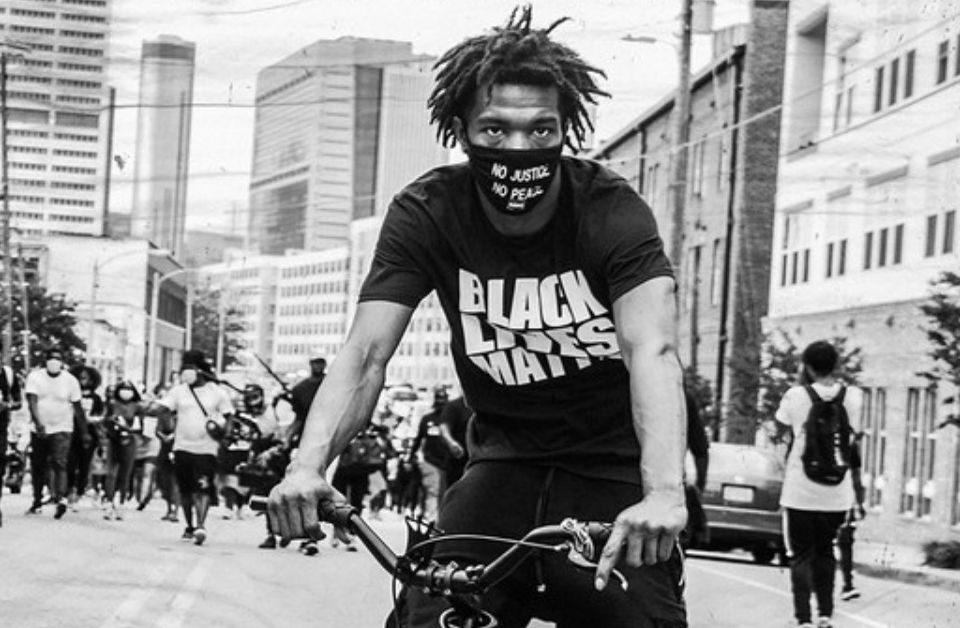By virtue of its experience, Hip-Hop as an artform in political in nature. In the tradition of early art as old as the Gilgamesh tablets, the words communicate the experience that each emcee is manifesting in the moment. Rap music is a capsule of culture — predominately affording the voiceless a mic to yell out to the universe that they existed. The exclamation is more than just a statement saying that they existed, but that they had something substantial to say.
Chuck D called the rap song, the “CNN of the streets.” In celebration of the new regime in the White House and in acknowledgment that despite how happy we are that 45 is out that we have to hold them accountable (keeping our eyes on the Biden-Harris administration with the same hawk eyes), here are 50 socio-political songs that keep in context the needs of the community as expressed by the gatekeepers on the genre.
“Fight the Power,” Public Enemy
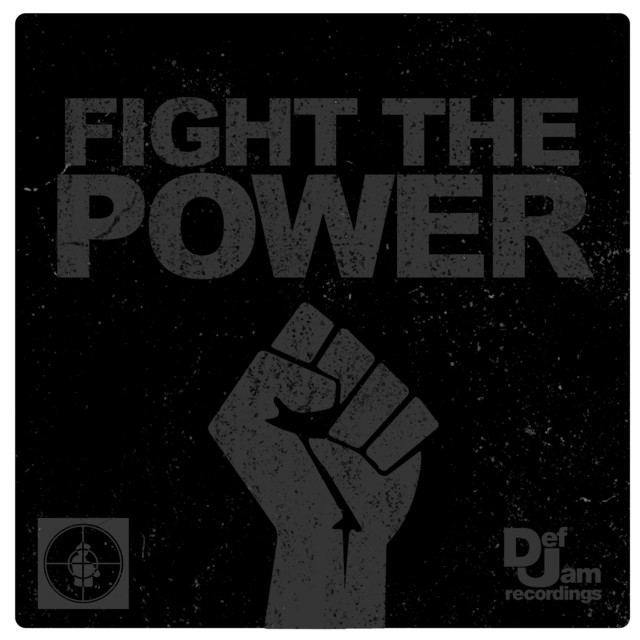
“Fight the Power” by Public Enemy is more than an anthem but it is a battle cry of liberation. Few songs have not only called systemic white supremacy out without a flinch than this one.
Originally a featured track on Spike Lee’s 1989 break out movie, Do The Right Thing, it swiftly took on a life of its own. It is one of among those rare breeds of songs that unites the spirit of all great Black leaders — invoking them through the use of Funk samples (James Brown), the Black church, civil rights and an in your face “what you think” that connected Gen Xers with Baby Boomers.
Just hearing Thomas “TNT” Todd, the civil rights lawyer from Alabama, say “”Yet our best trained, best educated, best equipped, best prepared troops refuse to fight. Matter of fact, it’s safe to say that they would rather switch than fight,” sets the listener for a ride that makes you just want to get your Harriet Tubman on.
Then Chuck roars, “1989!”
“The number another summer (get down) … Sound of the funky drummer …. Music hitting your heart ’cause I know you got soul …. (Brothers and sisters, hey) … Listen if you’re missing y’all … Swinging while I’m singing …. Giving whatcha getting … Knowing what I know … While the Black bands sweating … And the rhythm rhymes rolling … Got to give us what we want … Gotta give us what we need … Our freedom of speech is freedom or death … We got to fight the powers that be.”
The Recording Industry Association of America and the National Endowment for the Arts ranked this song, that bellows so profoundly with Chuck D’s voice, as one of the “Songs of the Century,” but we know it actually one of the greatest songs of our lifetime. Especially as those “Planet Rock” samples clashed with the Teddy Riley “Jam,” and he explains how you can keep your white heroes, “Elvis was a hero to most … But he never meant sh*t to me you see …Straight up racist that sucker was .. Simple and plain … Mother f**k him and John Wayne … ‘Cause I’m Black and I’m proud … I’m ready and hyped plus I’m amped … Most of my heroes don’t appear on no stamps.”
“The Message,” Grandmaster Flash and the Furious Five
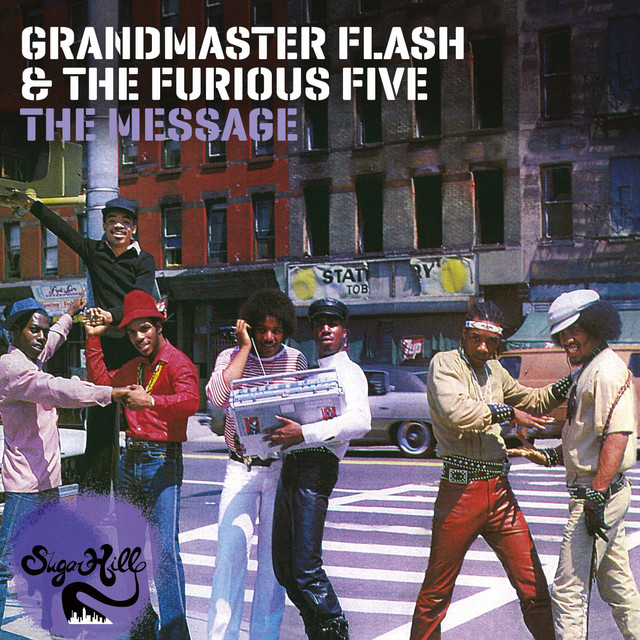
The chorus alone paints for the bleak reality of New York’s urban landscape. Melle Mel’s voice cuts through each verse with the poignancy of the time, while still displaying the power of being a timeless poet.
“A child is born, with no state of mind … Blind to the ways of mankind … God is smilin’ on you, but he’s frownin’ too … Because only God knows, what you’ll go through … You’ll grow in the ghetto, livin’ second rate … And your eyes will sing a song of deep hate … The place, that you play and where you stay … Looks like one great big alley way … You’ll admire all the number book takers … Thugs, pimps and pushers and the big money makers … Driving big cars, spendin’ twenties and tens … And you wanna grow up to be just like them … Smugglers, scramblers, burglars, gamblers … Pickpockets, peddlers and even pan-handlers … You say I’m cool, I’m no fool … But then you wind up dropping out of high school.”
What he did with this particular song, at this particular time, was timestamp for the world the arrival of conscious emceeing on a record. Before this song became a true war cry, a lot of rap music was rooted in partying and macking. But with his signature intro, “It’s like a jungle sometimes, it makes me wonder … How I keep from going under,” he asks the powerful question how do you keep pushing despite immeasurable trauma associated with race and social class.
Prolific and raw, “The Message” changed how Hip-Hop was used as a tool of cultural social action. As it showed clearly to politicians and social critics the nasty look of poverty, it also is a roadmap on how to navigate the streets the best one can with the resources dropped in their reality— instinct and old-head wisdom.
“FDT,” YG featuring Nipsey Hussle
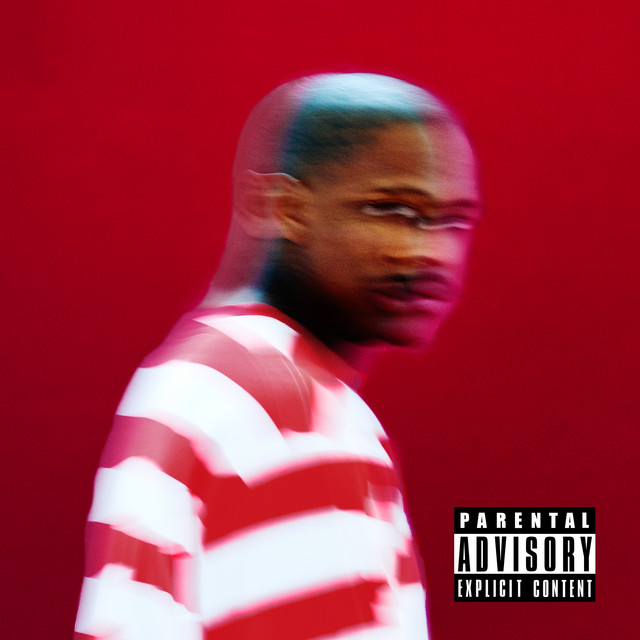
Just in case, you thought that the only revolutionaries in Hip-Hop had to carry the PE mantle on their backs, you would be mistaken. Most of the profound political talking that you hear from rappers comes from those whose every day speech is about kicking it with the homies. What makes them special is the raw passion and the common sensical approach to really complex ideas that many thought-leaders take long sessions to validate. The songs were plain talk about all the reasons why America should not have voted for the former real-estate mogul.
The song starts off with the Bay area rapper saying, “Just when I thought it wouldn’t get no sicker … Woke up one morning and heard this weird ass motherfucker … Talkin’ out the side of his neck … Me and all my peoples, we always thought he was straight … Influential motherfucker when it came to the business … But now, since we know how you really feel … This how we feel”
The chorus speaks, in its simplicity, volumes and is prophetically elevated in the third verse performed by Nipsey Hussle, “N*gga am I trippin’? Let me know … I thought all that Donald Trump bullshit was a joke … Know what they say when rich niggas go broke … Look, Reagan sold coke, Obama sold hope … Donald Trump spent his trust fund money on the vote … I’m from a place where you prolly can’t go … Speaking for some people that you prolly ain’t know … It’s pressure built up and it’s prolly gon’ blow … And if we say go then they’re prolly gon’ go.”
By uttering publicly, “It’s pressure built up and it’s prolly gon’ blow,” the deceased multi-hyphenate street preacher forecasted the 2020 Summer of Unrest and the #J6Insurrection in 2016.
With all his divisive language and its xenophobic policy (all reflected in the 4th and 5th verse), the two times-impeached and now booted from the White House, YG and Nip told us back then that homie was a dangerous lame.
“Reagan,” Killer Mike
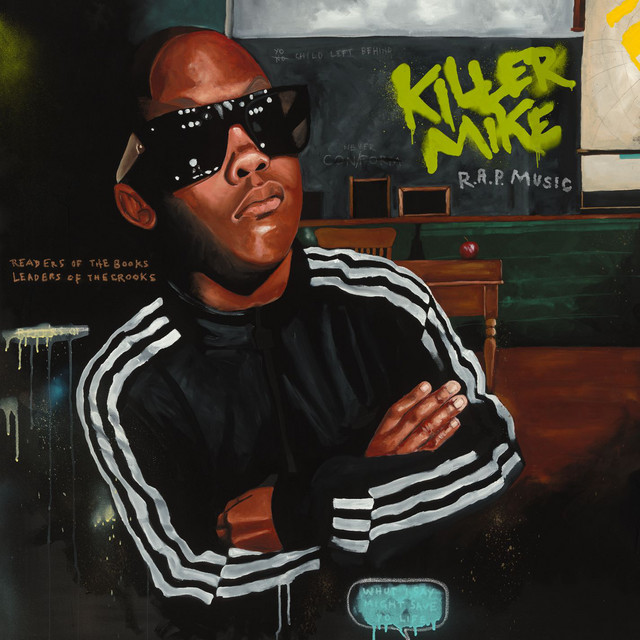
With the single “Reagan,” Killer Mike produced a song that could easily be taught in a political science classroom. So exquisitely executed in an Atlanta southern drawl, he unpacks all of the consequences that the Reagan administration had on Black and Brown people in the 80s.
The lyrics provide context to the drug wars and the war on drugs — linking it to a socio-political dice game gone wrong. The former president’s voice rings through the track with one steady admission: he didn’t know nothing.
The sample has the 40th Executive speech-a-fying, “ Out government has a firm policy not to capitulate to terrorist demands. That no-concessions policy remains in force, in spite of the wildly speculative and false stories about arms for hostages and alleged ransom payments, we did not, repeat, did not trade weapons or anything else for hostages, nor will me.”
History books would reveal that “that was a lie.”
In an interview with Spin Magazine, Mike shared, “A lot of people try to peg me as a political rapper and I’m not. I’m a social commentator and at times people have politicized the things I say, but I don’t care too much for any political party.”
He continued, “I care about people. Under Reagan, drugs were allowed to flood our community and wipe out two to three generations of people that could have kept my community growing and I take exception to that.”
I threw a BBQ when Reagan died. It’s not a vehement hate though, I’m not gonna spit on his “grave. I wanted to break down what the Reagan era was really like.”
And in the song, that is most certainly what he did.
“The end of the Reagan Era, I’m like ‘leven, twelve, or … Old enough to understand that shit’d changed forever … They declared the war on drugs, like a war on terror … But what it really did was let the police terrorize whoever … But mostly Black boys, but they would call us “n*ggers” … And lay us on our belly, while they fingers on they triggers … They boots was on our head, they dogs was on our crotches … And they would beat us up if we had diamonds on our watches … And they would take out drugs and money, as they pick our pockets … I guess that that’s the privilege of policin’ for some profits … But thanks to Reaganomics, prison turned to profits … ‘Cause free labor’s the cornerstone of US economics …‘Cause slavery was abolished, unless you are in prison … You think I am bullshittin’, then read the 13th Amendment … Involuntary servitude and slavery it prohibits … That’s why they givin’ drug offenders time in double digits … Ronald Reagan was a actor, not at all a factor/ Just an employee of the country’s real masters.”
The song was released in 2012, eight years after Reagan died and at dawn of President Obama’s second term. With a different scope he left two jarring thoughts: that the first Black president had the same agenda as one of the most reviled presidents of all times and that he was glad that he did.
“Black Cop,” KRS-One
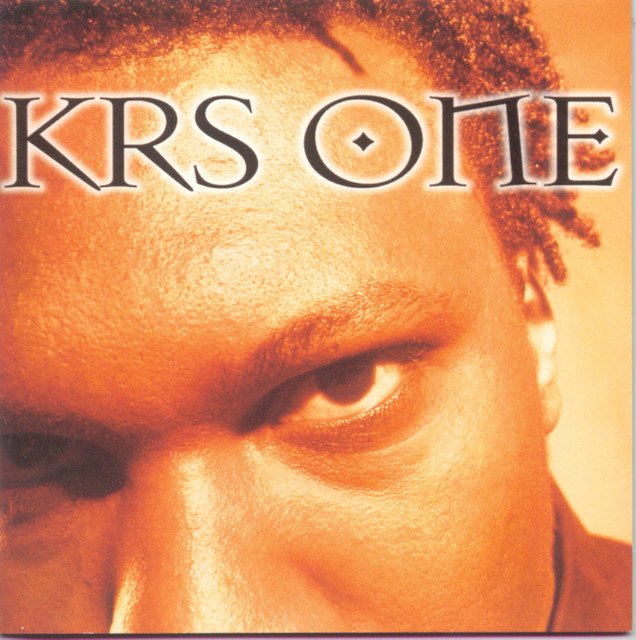
From the initial drop of its classic boombap beat, KRS-One’s anthem “Black Cop” one knows that the song is epic and choc with profundity.
By outlining the complicated relationship that the Black community has with America’s law enforcement structures, from the hiring of people of color to police other people of color, to its origins rooted in the overseer role on the plantation, the song schools the uninformed listener about the fears, distrusts and anxieties the Black cop causes the people.
In a thick patois executed rhymically over a dance hall groove, Kris Parker says, “Thirty years ago, there were no Black cops, You couldn’t even run, drive round the block. Recently police trained Black cop … to stand on the corner, and take gunshot. This type of warfare isn’t new or a shock. It’s Black on Black crime again nonstop.”
When the song was released in 1993, a pinnacle year in the horrific American crack era, it seems to take shots at the Black police for allowing drug dealers to rock while harassing law abiding folk.
“Here in America you have drug spot … They get the Black cop, to watch the drug sport. The Black drug dealer just avoid Black cop. They’re killing each other on a East Coast block, killing each other on a West Coast block. White police, don’t give a care about dat … Dem want us killing each other over crack … Anyway you put it it’s a Black on Black.”
But are all Black cops bad? No. And there is a place for them to rise to greatness.
It was a Black cop that was heralded as a hero during the 2021 Capitol Insurrection. Officer Eugene Goodman diverted an angry mob from attacking the Vice President and other members of Senate. He is one of the good ones. In fact, 29% of the Capitol officers are Black and over 50% of the police in the Washington D.C. Metro police department are Black. There are currently active cases of racial discrimination in the Capitol police force leveled by those Black cops that fight every day two wars (one in the streets and one with their peers).
Black cops do carry a heavy load as they balance the charge of duty — one that overwhelming discriminates against their people— and serving the community valiantly as the brass.
“Banned in the U.S.A.” 2 Live Crew
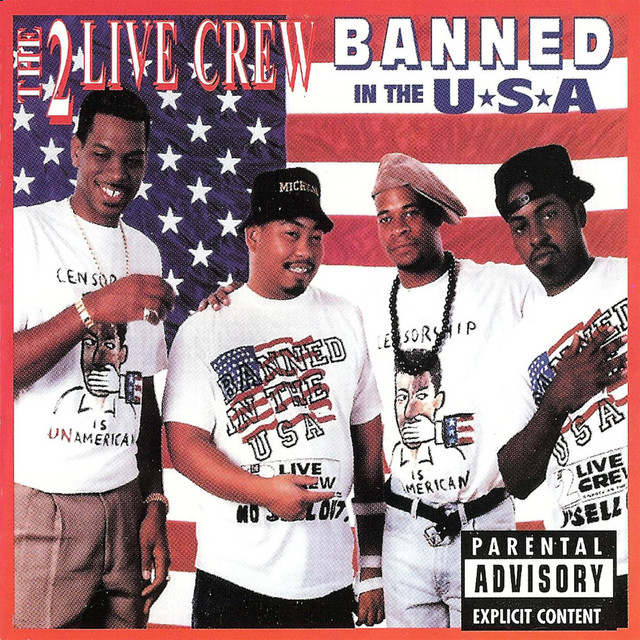
Sex sells and Luther Campbell knew this in way back in the 1990s. That’s when he dropped his hit song, “Banned in the U.S.A.” The song was a response to national criticism that he and his group, 2 Live Crew, received after dropping their previous 1989 album, As Nasty As They Wanna Be.
As Nasty was released with an advisory sticker that warned people that it had “Explicit Lyrics,” still the Florida Broward County Sheriff Mark Wichner pushed for the state courts to declare the project, “obscene.” According to The First Amendment Encyclopedia Judge Mel Grossman honored his request — and the Sheriff and other officers traveled the county and told record shop owners that should they sell the album, they would be arrested. Over 15 stores where approached with such warning.
By March of 1989, Skyywalker Records, Inc. fought back by filing suit on behalf of 2 Live Crew in federal district court to basically prove that the sheriff’s department actions was is called “illegal prior restraint” and to reverse the obscenity declaration. By definition, “prior restraint” is a form of censorship that permits the government to review the content of printed materials and prevent their publication.
A new judge, Jose Gonzalez, gave Uncle Luke some good news, while still supporting the previous court. He found that in the case Skyywalker v. Navarro (S.D. Fla. 1990), that the actions perpetrated by the sheriff’s office constituted an illegal prior restraint. But he did agree with previous court that the recording was indeed obscene. Gonzalez cited Miller v. California (1973) and referred to Kaplan v. California (1973) as precedent for finding “obscenity in nonpictorial matters.” 2 Live Crew’s freaky ode was indeed “banned.”
The group, consisting of DJ David “Mr. Mixx” Hobbs, Chris “Fresh Kid Ice” Wong Won, Mark “Brother Marquis” Ross and Luther “Luke Skyywalker” Campbell, determined to exercise their right of expression and launched a campaign manifested via the song, “Banned in the U.S.A.” A riff off of Bruce Springsteen’s mega hit “Born in the U.S.A.,” the song featured a sample of comedian mocking Ronald Reagan’s voice stating, United States’ government to be a government “Of the people, for the people, by the people.” But moreover, the song banged at the establishment saying:
“We’ve got white-collar people trying to grab our style … Saying we’re too nasty and we’re 2 live! Corrupted politicians playing games … Bringing us down to boost their fame … They must be joking thinking we will fall. But they’re like flies movin’ the wall. We stand tall from beginning to end … With the help from fans and all our friends … Freedom of speech will never die … For us to help, our ancestors died.”
“Smile,” Wale
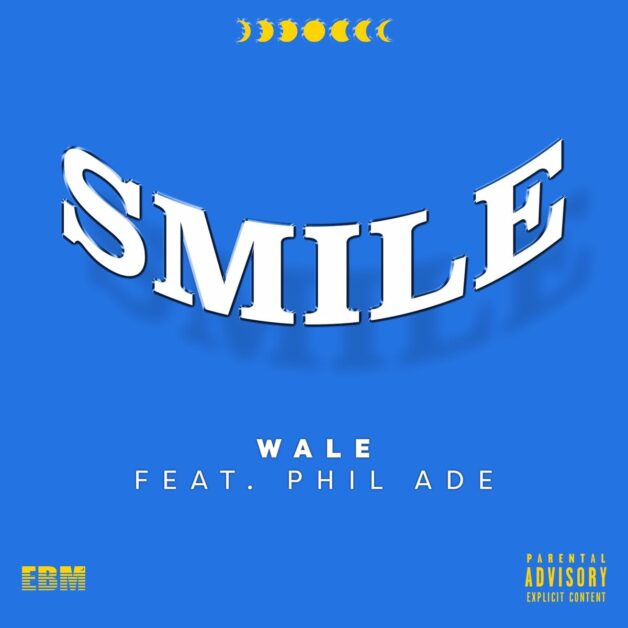
Wale’s “Smile” is an atypical political anthem in that it does not appear to be angry. It has a bounce to it and a step that could easily been heard as a feel good single put out by the D.C. hero to celebrate life. And to a certain extent it is … but it is more … it is a comfort song that gave his fans a coping mechanism to cling to during the destructive and racist Trump years.
The chorus sang a chant of gratitude during the conflucksh*t and the prophetic and cautionary tale what was about to pop off in 2017 with this crazy new president.
He said, “I got my family and I got my squad. And as long as they got me, then I’ll be just fine. So, I give God the glory ‘cause I have my child … and America don’t want me … That’s when I realized that we all need a reason to smile … I said we all need a reason to smile … Said it’s about to be O.D., but we gon’ survive … That’s why we all need a reason to smile.”
It seems the former Maybach Music lieutenant understood not only the peril that lied ahead of the nation, but also sought to share how ridiculous it was for the nation to elect 45 in the first place.
“And a possible bigot slash misogynist is about to run the whole damn thing… and the ballot my sister filled in another city didn’t do a goddamn thing. I’m a go crazy.”
What wasn’t true? Donald Trump not only said on television that he’s “grab them in the p*ssy,” but voter suppression and disenfranchisement has been so flagrant in American politics that Stacey Abrams and others have formed programs like Fair Fight to empower those who have lived their lives in constant fear that their votes don’t matter.
Wale’s first full verse (technically the second) also communicates in rapid speed the various things that he has to fall back on — relating to Blackness and the struggles with what we now know if the worst administration ever to exist in the country.
“The Alt Right hate us… some Black baby mommas hate us … We only learn half of the drama, other side crazy … On behalf of Charlamagne, I’m sure he ain’t tradin’ sides. Maybe I should meet Tomi Lahren, I’ll Lauryn Hill her. I’m just a young Black rappin’ @ss African … Ain’t never wanted to have it and now he has it his own way. I’m smokin’ purple, the law enforcement be murkin’ brothers. The moon lit and I’m Cottonmouth like Mahershala.”
“It’s like you got a curse if your currency low … The world is a dirty fuckin’ experiment. They don’t care if its hurtin’ us.”
But like the song title suggests, while there are all of these issues that could destroy people of color, there is a reason to song.
“Black lives matter, ’cause black lives target practice. Can’t even imagine what would happen with no phones cameras … Black lives matter Black live the dopest ever … Just wanna remind you, I think it’s time that we show it better forever.”
“America,” Logic featuring Black Thought, Chuck D, No ID and Lenbo
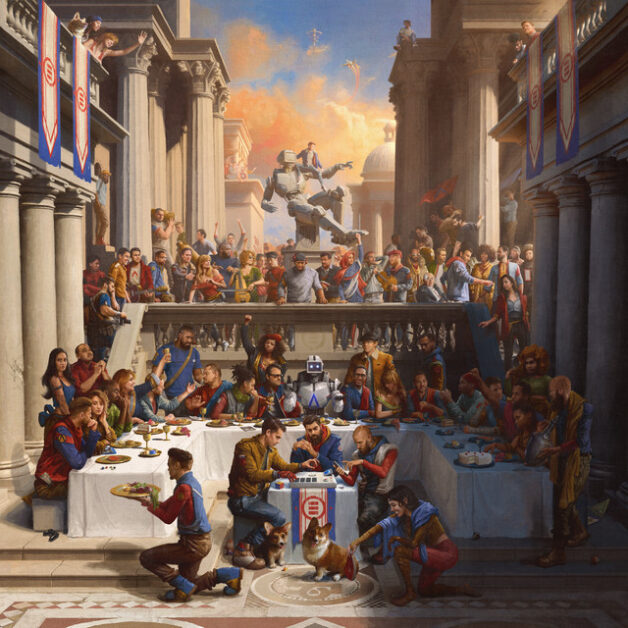
There has to be a voice for this generation (born in 1990s and above) that articulates the outrageous disgust it has for the culture of American life. Logic’s “America” has that bold gall. Reminiscent of the Public Enemy’s Bomb Squad, the song is urgent and angry. It is an anger that Logic had really relayed in his music, rapped in racial frustration, socio-political angst and immaculate lyricism from Chuck D, Black Thought, Lenbo, the artist and producer No I.D.
Written in 2017, around the time that Donald Trump was settling into his position as the president, and in his verse took no hesitancy to pop a man that once was considered one of the culture’s most prolific thinkers, Kanye West.
“George Bush doesn’t care about Black people … 2017 and Donald Trump is the sequel so … Sh*t, I’ll say what Kanye won’t … Wake the f–k up and give the people what they want. Man, it’s all love but the youth is confused. Your music is 20/20 but them political views … is blurred I ain’t trying to leave ya name slurred … ‘Cause honestly I idolize you on everything, my word. But I gotta say what need be said … ‘Cause I ain’t f*ckin’ with that hat, with the colors that’s white and red.”
Then he cemented himself in the conversation, putting his bi-racial identity on the table.
“I know some people wish I’d act white instead … Say I’d use my pigment as manifestation to get ahead … F*ck that, everything I do, I do it right … To teach the people that they have the power to fight … and not with the semi-automatic bullets in the night … So everybody, everywhere, listen to this fact … Nobody treated equally, especially the Black.”
If you don’t get it the first time, bring it back!”
Logic also took to Twitter and announced No I.D.’s spit-kicking on the track and said, “Can we just take a moment to point out the fact that NO ID @cocaine80s is rapping on my album 4 the first time in 20 years What?! Like what?”
The Chicago track master is outraged at some of the comments heard around the country, “Now send the Black back to Africa… Build a wall for the Mexicans … Send the whites back to Europe … Give the land to the Native American.”
With “America” Logic drops a song that not only surrounds himself with legends in Hip-Hop with the Roots and PE front-runners, but it is whole of the song that reminds us that freedom fighting is not lost on millennials and Gen Zers.
“Changes,” Tupac
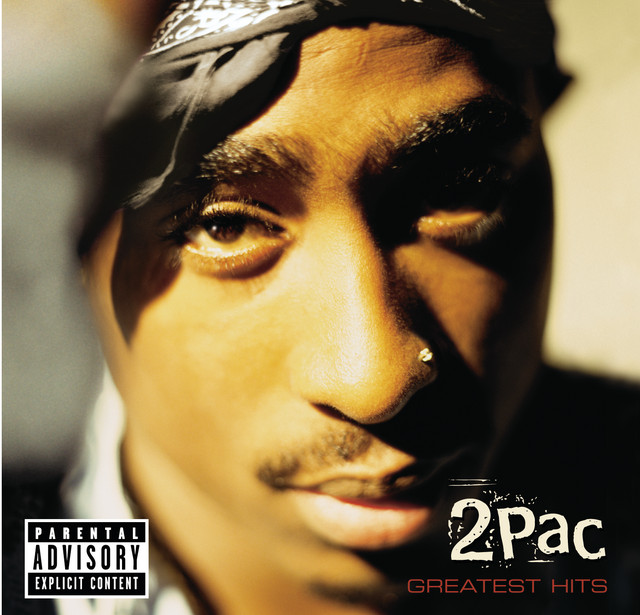
In arguably Tupac’s biggest posthumous release, the child of a Black Panther took on issues heavier than his 169 lb frame could carry and more oppressive than his 25 years of living could bear. This song addressed things very specific to the community that nurtured him from birth and was a poetic cry for change.
“I see no changes, wake up in the morning, and I ask myself … Is life worth living, should I blast myself ? I’m tired of bein’ poor, and even worse I’m Black … My stomach hurts, so I’m lookin’ for a purse to snatch …. Cops give a damn about a negro … Pull the trigger, kill a n*gga, he’s a hero … Give the crack to the kids who the hell cares … One less hungry mouth on the welfare … First, ship ’em dope and let ’em deal the brothers … Give ’em guns, step back, watch ’em kill each other … It’s time to fight back, that’s what Huey said … Two shots in the dark, now Huey’s dead.”
Aptly entitled, “Changes” addressed poverty, racism, the dynamics of the Black Family – and more interestingly calls on us to heal our own wounds.
“I got love for my brother, but we can never go nowhere … Unless we share with each other … We gotta start makin’ changes … Learn to see me as a brother instead of two distant strangers … And that’s how it’s supposed to be … How can the devil take a brother, if he’s close to me? I’d love to go back to when we played as kids … But things changed, and that’s the way it is.”
Throughout the song, he further acknowledges the pain that we sometimes bring to our own communities in the form of drugs and Black-on-Black violence; but doesn’t forget the role that our oppressors have play in all of this. ‘Pac was different. He was prophetic in every sense of the word. On one hand he spoke truth to power like the freedom-fighting blood that ran through his veins would require … and also in the mystical sense. He could see what many of did not see…
“And although it seems heaven-sent, We ain’t ready to see a Black president …” From his grave he speaks … as if he knew Jan. 6 was inevitable.
Yup … Pac was different.
“F*ck tha Police,” N.W.A.
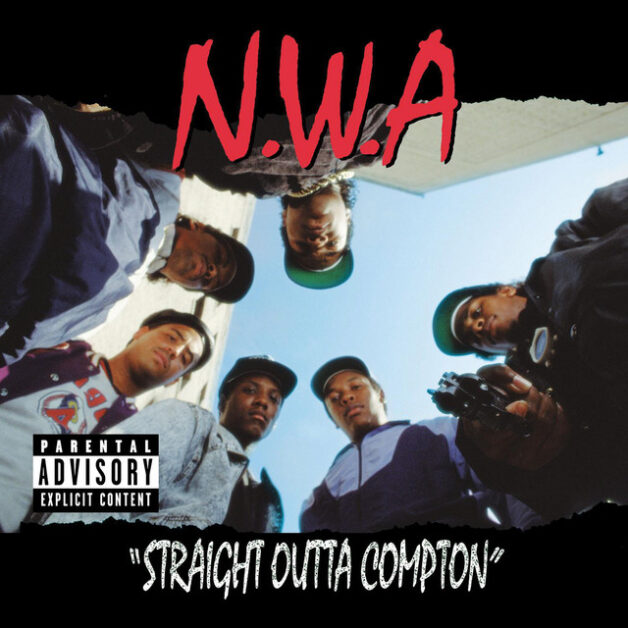
“F*ck the Police” is probably one of the most “arresting” songs that N.W.A. ever put out. The music was not like anything anyone had ever heard. Moreover, no one knew that they could say those things like that to the police! Ice Cube would later say that the song came out his frustration with law enforcement that routinely harassed him and his friends.
Released 15 years (shy 2 days) from the founding of Hip-Hop, it birthed something else. The record appeared on the Straight out of Compton album and birthed a bold energy of protest against racial injustice, affording Black folk the permission to say that there was something wrong about police-involved violence perpetrated by way of racial profiling. It is said that while people clearly knew that the police operated from a racist perspective on many levels, they moved as if they were blinded by the illusion that all cops did what they absolutely had to do. The FBI even sent them a note to Ruthless Records to say that the lyrics misrepresented police. Radio stations across the world banded the spinning of the record — but all of that attention made the single bigger.
Just listen to Ice Cube break it down how racial profiling ravished his teen years:
“Fuck the police comin’ straight from the underground … A Young nigga got it bad ’cause I’m brown … And not the other color so police think … They have the authority to kill a minority … Fuck that shit, ’cause I ain’t the one … For a punk motherfucker with a badge and a gun … To be beatin’ on, and thrown in jail … We can go toe-to-toe in the middle of a cell … Fuckin with me ’cause I’m a teenager … With a little bit of gold and a pager … Searchin’ my car, lookin’ for the product … Thinkin’ every nigga is sellin’ narcotics.”
Interesting enough, the record almost 33 years after its release is still relevant and continues to communicate this ever growing sentiment about crooked law enforcement.
In 1988, the group had no idea that this would be the song that opened up doors that laid down the foundation for West Coast’s rap music. There would be no Kendrick Lamar or Vince Staples the way we know them if were not for this song.
“We the People,” A Tribe Called Quest
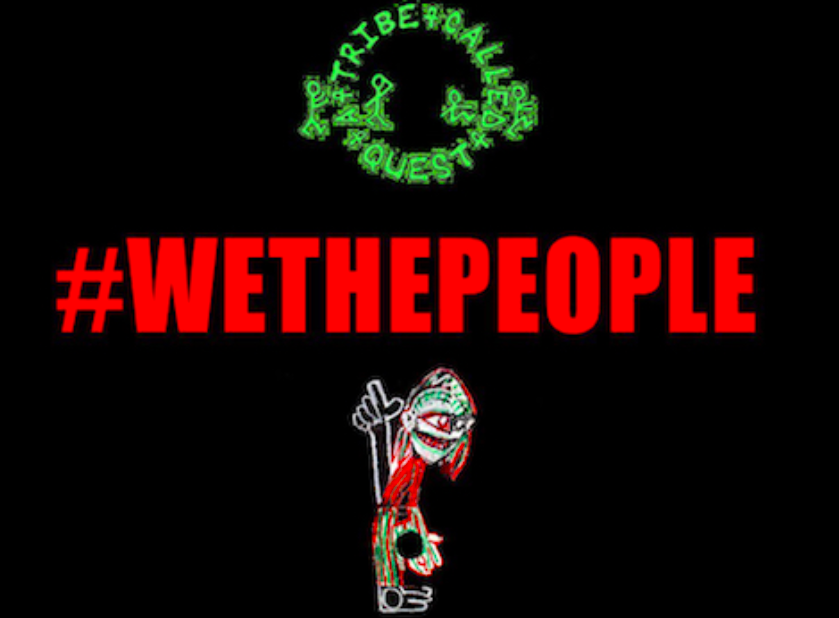
A few months after the devasting death of group founding maker, Malik “Phife Dawg” Taylor, A Tribe Called Quest returned to the music industry with a new project called We Got It From Here … Thank You 4 Your Service. The song, “We the People” was not only the first single, but featured vocals from the 5 Ft. Freak.
The song is considered not only a call to action, but was a revelation to what MAGAmaniacs believe about undesirable people within the continental United States of America.
ATCQ has always, in their collective voice, has had the lyrical proclivity to provoke free and conscious thought among their audience. So no one was surprised that the founders of the Native Tongue’s genius-ly made a political statement when titling the track. The group pulled from the constitution the term “We the People” to highlight the irony of patriotism promoted by at the time the current president.
The Abstract starts by masterfully looking internally as he critiques the sociopolitical atmosphere that Black and Brown people find themselves in, as they navigate a debased mentality while they are being oppressed by a systemic monster of manipulation.
“You in the killing-off-good-young-n*gga mood … When we get hungry we eat the same f**king food …The ramen noodle … Your simple voodoo is so maniacal … We’re liable to pull a juju … The irony is that this bad b**ch in my lap … She don’t love me, she make money, she don’t study that … She gon’ give it to me, ain’t gon’ tell me run it back
She gon’ take the brain to wetter plains, she spit on that … The doors have signs with, don’t try to rhyme with … VH1 has a show that you can waste your time with … Guilty pleasures take the edge off reality … And for a salary I’d probably do that shit sporadically.”
Phife’s verse is classic Malik. Mixing his wit with sports metaphors, he drops bomb on the industry, fans and the powers that be for trying to set metrics on what makes Hip-Hop “hot.”
“You bastards overlooking street art … Better yet, street smarts but you keep us off the charts … So mother**k your numbers and your statisticians … F.. k y’all know about true competition? That’s like a AL pitcher on deck talking about he hittin’ … The only one who’s hitting are the ones that’s currently spittin’ … We got your missy smitten rubbing on her little kitten.”
And while, in the song, they are blasting the culture— it is the chorus that stings the most. Now Uncles and Fathers in the culture, they show you have to speak up and regulate for “the people.” Consider Q-Tip’s chorus that aims at the former president’s administration.
“All you Black folks, you must go … All you Mexicans, you must go … And all you poor folks, you must go … Muslims and gays … Boy, we hate your ways … So all you bad folks, you must go.”
The magic of “We the People” reminds us why Tribe is so iconic.
Phife articulates it best. Tribe has never been “not just nigger rappers with the bars.”
“The Proud,” Talib Kweli
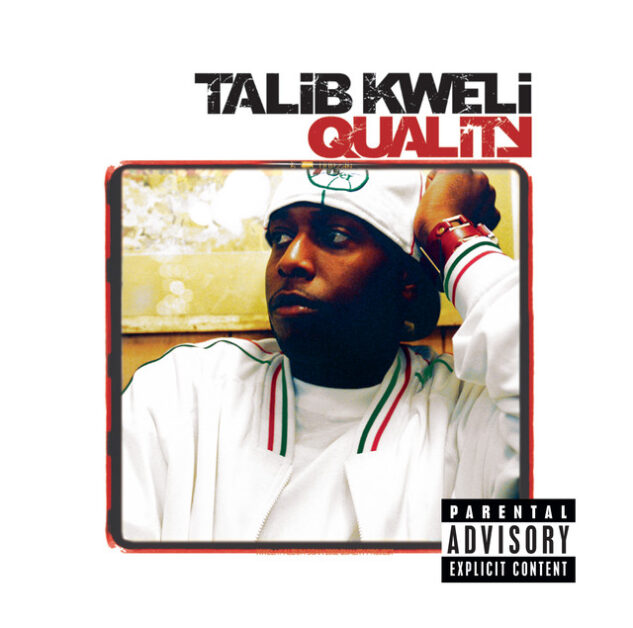
One might say Talib Kweli’s purpose in Hip-Hop is to awaken the sleeping mind. His level of commitment to using his platform to elevate and inform has helped him craft his own memoir, “Vibrate Higher.” But before he became an author, his has given the world almost 20 albums to push forth artistry and activism.
With his song, “The Proud” the Brooklyn lyrical miracle has essentially made an ode to the resilience of Black life in America.
Lyrics like “We survive, it’s more than pride. We stay alive, ready to ride,” celebrate how people of color plow through to racial adversity.
Kweli calls direct attention to the double standard approach to justice in America.
“August 4, 2001 … A drunken police officer mows down an entire family in Brooklyn
The judge lets him go with no bail … It reminds us, of just how worthless our lives are to the justice system.”
This song is filled with powerful images but perhaps the most profound is when Kweli champions niggas with knowledge over niggas with guns. Then he calls out the selective policing initiatives of Prop 21.
“I already know the deal but what the f*** do I tell my son?” A looming question for all Black parents.
“N****z with knowledge is more dangerous than than n****z with guns … They make the guns easy to get and try to keep n****z dumb … Target the gangs and graffiti with the Prop 21 … I already know the deal but what the f*** do I tell my son?
I want him livin right, livin good, respect the rules … He’s five years old and he still thinkin cops is cool … How do I break the news that when he gets some size … He’ll be perceived as a threat or see the fear in they eyes … It’s in they job description to terminate the threat … So 41 shots to the body is what he can expect … The precedent is set, don’t matter if he follow the law … I know I’ll give my son pride and make him swallow it all (damn!)”
“Welcome to America,” Black Thought
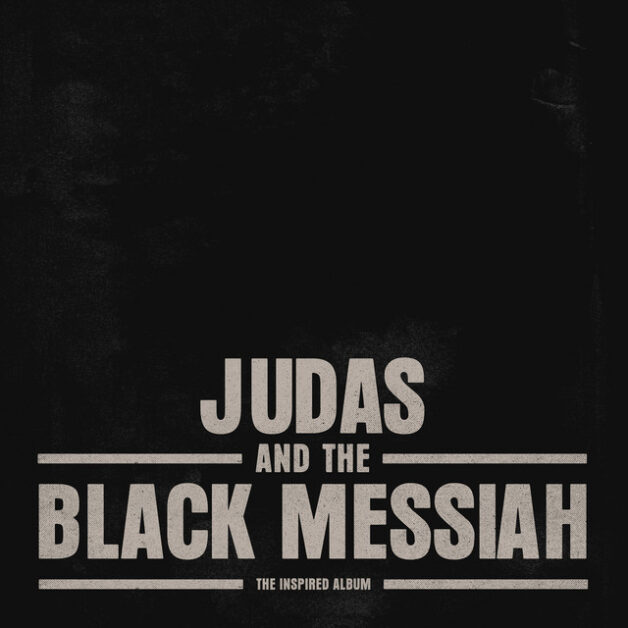
From the soundtrack of Judas and the Black Messiah, Black Thought offers a soulful and melodic song with “Welcome to America.” Therein, with his lyrical genius, he takes the listener through a comprehensive trek through Black nationalism. With a Hamptonian vibrato, the Philly rapper commits to a life dedicated to liberation.
“The sins of the father my pop gave me to suffer … The friends I would follow was crack babies and hustlers … It’s steel sharpen steel in the block, made me a cutler … My pen is from the future like Octavia Butler (Welcome to America, oh) … My grandmother sutured a flag from bloody cotton … The fruits of her labor alas already rotten (Welcome to America, yeah, ayy) … My man said, “Yo, it’s crazy how fast that we’ve forgotten
That we used to pull boxes and plows like we were oxen.”
In the song, he includes himself in the brilliant history of freedom-fighting, relating his personal struggles to those Africans shackled during the great MAAFA to those who had bloodied-finger tips from picking cotton. Revolutionary is used often in rhymes, but Tariq brings life to the complicated work that many Black men and women have engaged to liberate themselves from the foundation of hate that built this nation.
“I ran hard from Jamestown with slaves, found Jesus … And found demons that never be charged with malfeasance … I sat through they revival, though I never found credence … I found that we had never know shit about freedom … I’ve been charged with treason and I’ve been scarred and freezing … And I’ve been called a nigga and then called a heathen
When hounds found me, they couldn’t even tell if I was breathing … In America where on black men, it’s open season.”
Released in 2021, it is one of the most powerful songs on his career.
“This is America,” Childish Gambino
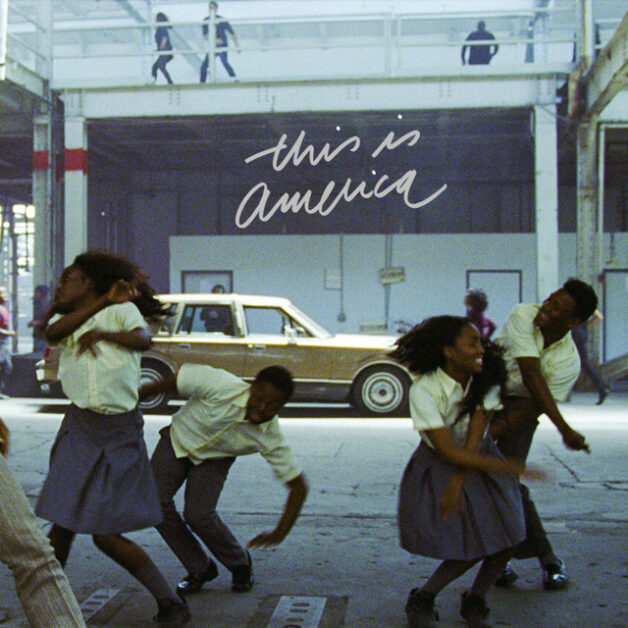
Arguably the most politically charged songs of modern Hip-Hop. Childish Gambino’s “This is America” holds a mirror to the face of American society. Forcing all listeners to consider their role in America’s contorted reflection including the glutenous manifestations of our greed represented by drugs, guns, revelry and materialism.
“Don’t catch you slippin’ now … Look what I’m whippin’ now … This is America (skrrt, skrrt, woo) … Don’t catch you slippin’ now (ayy) … Look at how I’m livin’ now … Police be trippin’ now (woo) … Yeah, this is America (woo, ayy) … Guns in my area (word, my area) … I got the strap (ayy, ayy) … I gotta carry ’em … Yeah, yeah, I’ma go into this (ugh) … Yeah, yeah, this is guerilla, woo … Yeah, yeah, I’ma go get the bag … Yeah, yeah, or I’ma get the pad … Yeah, yeah, I’m so cold like yeah (yeah) … I’m so dope like yeah (woo) … We gon’ blow like yeah (straight up, uh)”
While the people are more concerned with partying than anything else, it is the elements of this massive American “party” which has contributed to the chaos of the modern American experience in 2018. Police violence, racism, social media and ulterior political motives seem to be the root of the chaos but still people seem to be more concerned with partying.
“Look how I’m geekin’ out (hey) … I’m so fitted (I’m so fitted, woo) … I’m on Gucci (I’m on Gucci) … I’m so pretty (yeah, yeah) … I’m gon’ get it (ayy, I’m gon’ get it) … Watch me move (blaow) … This a celly (ha) … That’s a tool (yeah) … On my Kodak (woo, Black) … Ooh, know that (yeah, know that, hold on) … Get it (get it, get it) … Ooh, work it (21) … Hunnid bands, hunnid bands, hunnid bands (hunnid bands) … Contraband, contraband, contraband (contraband) … I got the plug on Oaxaca (woah) … They gonna find you like blocka (blaow) … Ooh-ooh-ooh-ooh-ooh, tell somebody … (America, I just checked my following list and) … You go tell somebody … (You mothaf**kas owe me) … Grandma told me … Get your money, Black man (Black man).”
The infectious beat actually had people dancing without really listening to the words. Staccato in nature, each stunted statement was as revolutionary as it was sparce. The disturbing official video broke them out of the trance that simply overwhelmed fans who are living out loud the lyrics of the song.
“Land of the Free,” Joey Bada$$
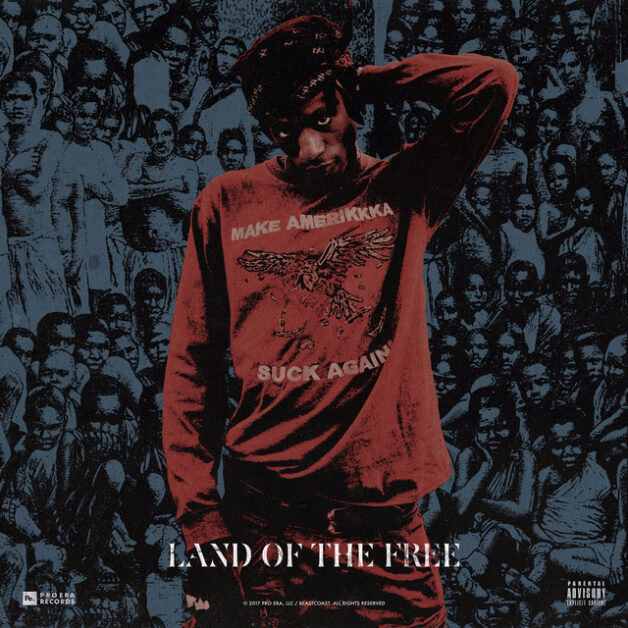
Brooklyn’s Joey Bada$$ is one of the most powerful voices of his generation.
The way that he balances his understanding of street culture and Blackness in relationship with American politics, sets him apart from the rest of his Mil-GenYs — directly aligning him in the tradition of other Brooklyn Golden Era rappers.
He raps with the understanding that his mic is on and people are listening. In his song, “Land of the Free,” off the ALL-AMERIKKKAN BADA$$ album, he speaks as an American son sharing the neglect he feels from his mother country. Intentionally released on Joey’s birthday and the same day as President Trump’s inauguration, Joey is fully aware of the weightiness of the moment. He is aware of the tide that the incoming president will wash over 2017 and the toxic splash it continues to make.
Verse by verse, he dances with the struggles of being Black in the three K’d America, while also trying to do justice the rich legacy he inherited from his enslaved ancestors. He opts not to fall victim to the propaganda of this nation’s promised equity, and push for seat at the table.
“Sometimes I speak and I feel like it ain’t my words … Like I’m just a vessel channeling inside this universe … I feel my ancestors arrested inside of me … It’s like they want me to shoot my chance and change society … But how do I go about it? Tell me where I start? My destiny rerouted when I chose to follow heart … You told to follow suit, but tell me what it do for you? Except weigh you down, now you trapped inside the cubicle they built for us … The first step in the change is to take notice … Realize the real games that they tried to show us … 300 plus years of them cold shoulders … Yet 300 million of us still got no focus”
In conversations about the song, he attributes its almost homiletical message to his ability to tap into a “higher frequency.” He states that he is aware that he is a vessel that these higher frequencies are choosing to use for a higher purpose and that in essence, “Land of the Free” is a manifestation of this. This song is not just a political outcry, but an unapologetic vibe that proves that you can be cool and aware in the same breath.
“Sorry, America, but I will not be your soldier. Obama just wasn’t enough – I need some more closure … Donald Trump is not equipped to take this country over … Let’s face facts ’cause we know what’s the real motives.”
“Holler If Ya Hear Me,” Tupac Shakur
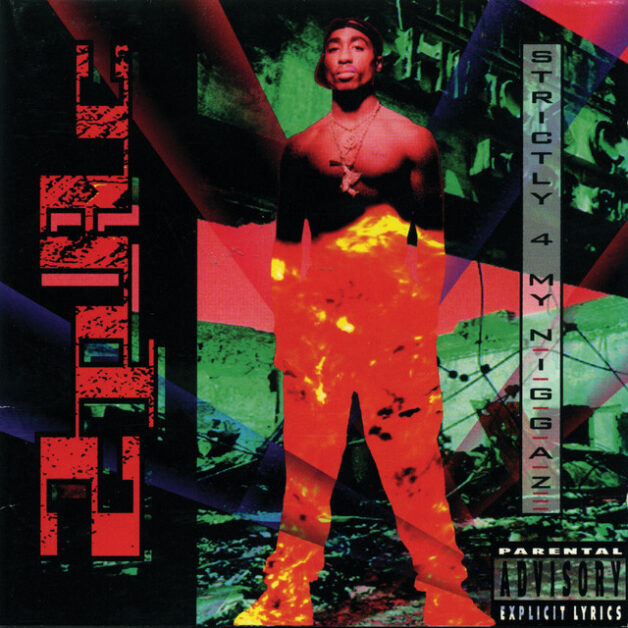
Tupac Shakur, when he was in his most celebrated conscious mind, was a sublime poet and master of conscious streams of thought. His song, “Holler If Ya Hear Me,” from the 1993 Strictly 4 My N.I.G.G.A.Z. album, was a revolutionary call to action that demonstrated to the world — his unique gifting and personal socio-political positioning.
In efforts to highlight the daily injustices and the atrocities enacted toward the Black community, this son of a Black Panther used this song as protest. It, to this day, is a direct response to the systemic white supremacy.
“Until then … Raise up! Tell my young Black males … Blaze up! Life’s a mess don’t stress … Test … I’m givin’ … Much love to my brothers in tha pen … See ya when I free ya … If not, when they shut me in … Once again, is there no one else strapped
Keep ya hands on ya gat … Now ya boys watch ya back … Cause in tha alleys of cali I’ma tell ya … Mess with tha best and tha vest couldn’t help ya … Scream, if ya feel me … See it clearly? your too near me … Holler if ya hear me!”
Pac is calling for the return of the Black radicals. With “Holler …” he is beckoning to individuals who are willing to make change by force and through the classic “pump ya fists like this,” providing an anthem that Hip-Hop in the 90s could stand in solidarity to.
“Proud to be Black” by RUN-DMC
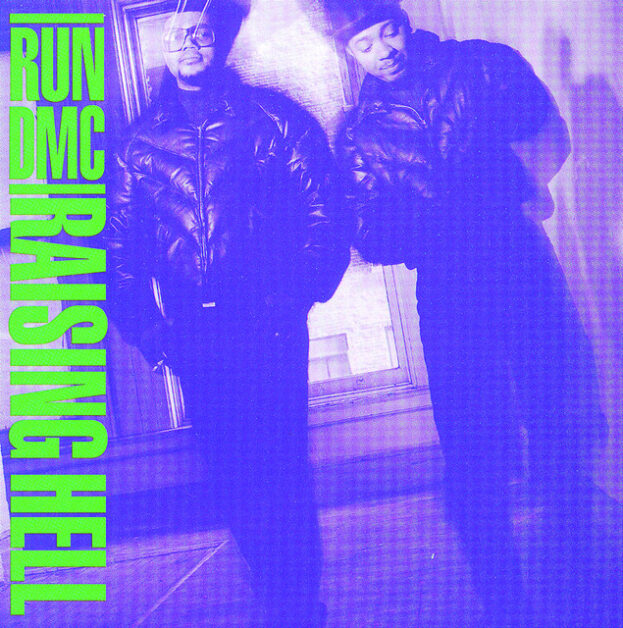
“You know I’m proud to be Black, y’all … and that’s a fact, y’all!”
RUN-DMC were Hip-Hop’s first commercial golden children. MTV adored them. Adidas dressed them. The Beastie Boys opened for them and in all of the swagger of their Hollis heritage, they had no problem saying loud and proud that they were proud to be Black. Why wouldn’t they have worn this pride like the black leather jackets and fedora hats that made them so popular … it was in the air around them.
The group grew up about 15 minutes away from James Brown, a long-time resident of Addisleigh Park in Queens, NY (just south of their 205th and Hollis Ave. home). In 1968, the “Godfather of Soul” released the singles “Say it Loud — I’m Black and I’m Proud!” part 1 and part 2. Later, after it rocked the charts and became an anthem for Black youth everywhere, in a bold liberation theological and ontological exercise of empowerment he put the songs on the A Soulful Christmas LP.
Surely, Joseph Simmons, Darryl McDaniels, and Jason Mizell, took that pride and incorporated it their music.
“Black, god damn, I’m tired my man … Don’t worry ‘bout what color I am … Because I’ll show you how ill, this man can act … It could never be fiction cause it is all fact … And if you get in my way, I will not turn back … I’m proud of my name, my name is Darryl Mack … I’m Black and I’m proud, and I’ll say it out loud … I’ll share my story with the whole crowd, augghh! You know I’m proud to be Black y’all … And that’s a fact y’all … And if you try to take what’s mine … I take it back y’all, it’s like that.”
The song was a quick history lesson, dropping jewels about Harriett Tubman, Malcolm X, George Carver Washington, Jesse Owens, and Martin Luther King, Jr. But also, the group introduced an understanding that Africans in American all think at one time in their lives … little Brown children need an extra portion of God’s protection.
“We’re gonna tell ya somethin’ put your mind in a swirl … God bless the next baby that comes in this world … The world’s full of hate discrimination and sin … People judgin’ other people by the color of skin … I’ll attack this matter, in my own way … Man, I ain’t no slave, I ain’t reelin’ no hay … Written a deposition, in any condition … Don’t get in my way cause I’m full of ambition … I’m proud to be Black (and I ain’t takin’ no crap) … I’m fresh out the pack (and I’m proud to be Black) … So take that!”
The Rock & Roll Hall of Famers definitely know how to rock arenas, but inspire you to love yourself.
“The Bigger Picture,” Lil Baby
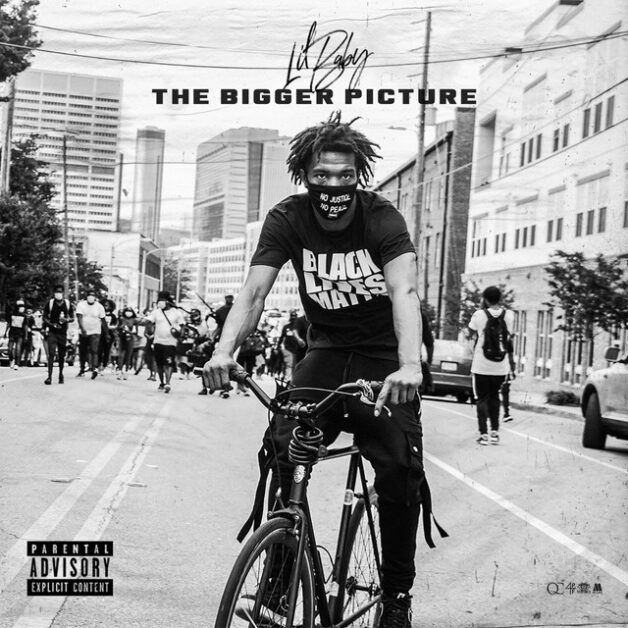
Because he is from a certain generation, many may write Lil Baby off. They might think that he doesn’t have anything to say, but they would be wrong. With his 2020 single, “The Bigger Picture,” he shifted mindset of those naysayers. It was here that he picked up the rich legacy of those rappers that came before him that used their platform to add to the liberation of people of color.
“It’s too many mothers that’s grieving … They killing us for no reason … Been going on for too long to get even … Throw us in cages like dogs and hyenas … I went to court and they sent me to prison … My mama was crushed when they said I can’t leave … First I was drunk, then I sobered up quick … When I heard all that time that they gave to Taleeb … He got a life sentence plus.”
Inspired by the brutal murder of George Floyd, it was an organic response with the necessary impact to inspire his fans to take action. In fact, the song seemed to be an anthem for the Summer of Civil Unrest.
What was most powerful is that instead of straight fire and brimstone, Lil Baby offers some perspective on why Black America erupted.
“We gotta start somewhere … Might as well gon’ ‘head start here … We done had a hell of a year … I’ma make it count while I’m here … God is the only man I fear … It’s bigger than black and white … It’s a problem with the whole way of life … It can’t change overnight …”
“Remove 45,” De La Soul featuring Styles P, Talib Kweli, Pharoahe Monch, Mysonne & Chuck D.

When history looks back at the 2020 Presidential Election, Hip-Hop will be one clear voice that has to be mentioned. Groups with an invested stake in his removal stepped up and De La Soul was at the forefront of the movement.
Native Tongue fans from all across the world celebrated new music from the iconic group and were even more happy that they released something with meaning.
It had been over four years since the trio dropped, the GRAMMY-nominated And The Anonymous Nobody. It would be the fourth time that group was invited to the big music industry dance, and their sixth nomination (having won one for Best Pop Collaborations with Vocals in 2006).
Those who have come to appreciate Posdnuos’ intricate lyricism and Dave aka Trugoy refreshing flow enjoyed the offering but have been thirsting for a new splash, something that would not only bob their heads, wet their whistle, add profoundly to their remarkable discography that almost always is populated with classic Hip-Hop music, but also move them to act in power.
Their fans know that music is supposed to move you to act in power. From the rip, they give us our marching orders:
“We must defend the rights of every citizen to live without violence, prejudice, or fear (Russia, Russia, Russia, Russia, Shut up) … How you doin’? Hey Donny! … (We can’t have a situation, like, what happened in Minneapolis to descend further into lawless anarchy and chaos) … We support the overwhelming majority of police officers (He’s a bad, bad guy) … Who are incredible in every way (Ah!) … And devoted public servants (I can’t breathe, I can’t breathe!) … Listen here, Trunk … And I’m in the White House and I was lonely (Fire the president, please) … I said, “Let’s go to Iraq!” (Sheesh) When the looting starts, the shooting starts.”
Hallelujah! These rap gods have heard and answered their fans’ cry.
The song features some of their friends: Styles P, Talib Kweli, Pharoahe Monch, rap activist Mysonne & Chuck D and is saturated with bar alchemists, who have spit pure gold in this politically charged track aimed to get people out to vote— pointing to facts as to why President Trump has to go.
“When it comes to this president and his administration we need to exercise our right to vote and REMOVE him from office,” says POS.
“Remove 45” aims to encourage people to get out to vote and will be a little taste of what is soon to come.
The legendary group is in the lab working on a new project produced by none other than DJ Premier and Pete Rock, arguably two of the biggest superstar producers of the culture.
“By the Time I Get to Arizona,” Public Enemy
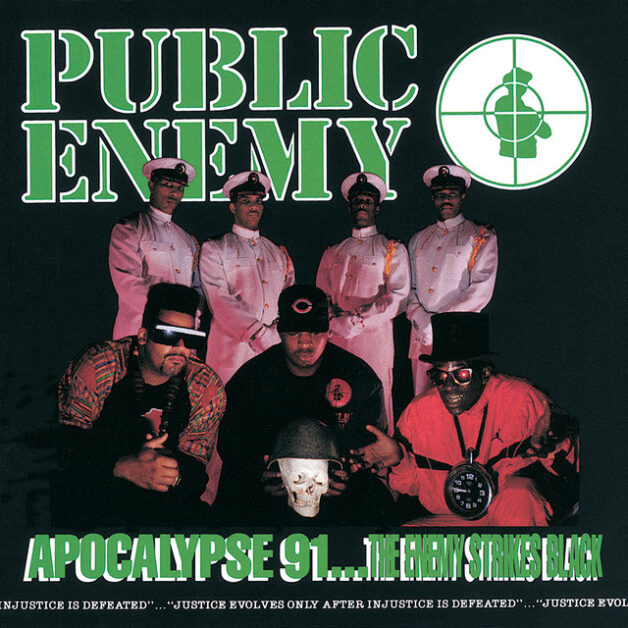
Public Enemy is known for starting off their songs with powerful statements. So when Sista Souljah opens up the rap song “By the Time I Get to Arizona,” she set the tone.
The pre-cursor and the direct resistance-ancestor of Tamika Mallory, Souljah blasted Arizona for not recognizing Martin Luther King, Jr.’s Day as a national holiday.
“This is Sister Souljah. Public Enemy, Security of the First World, and all allied forces are traveling west to head off a white supremacy scheming to destroy the national celebration of Martin Luther King’s birthday. Public Enemy believes that the powers that be in the states of New Hampshire and Arizona have found psychological discomfort in paying tribute to a black man who tried to teach white people the meaning of civilization. Good luck brothers, show ’em what you got.”
The song leaps into protest as Chuck D details all the reasons why as a citizen he believes Dr. King deserves for his holiday be nationally recognized. Under Evan Mecham’s governorship, MLK Day was canceled, despite being signed into law in 1983. The people of the state actually voted against a proposition create a state holiday for Dr. Martin Luther King, Jr. by a margin of 17,000 votes in 1990. Chuck told the media that he was a fan of Isaac Hayes’ sing “By the Time I Get to Phoenix” and he flipped to address the very serious issue at hand, the refusal to put respect on the slain civil rights leader’s name.
“Why I want a holiday? Damn it, ’cause I wanna … So what if I celebrate it standin’ on a corner? I ain’t drinkin’ no forty, thinkin’ time with a nine … ‘Til we get some land, call me the trigger man … Lookin’ for the governor, huh? He ain’t lovin’ ya, ha? But here to trouble ya, he’s rubbin’ ya wrong … Get the point and come along, he can get to the joint … I urinated on the state while I was kickin’ this song … Yeah, he appear to be fair … The sucker over there, he try to keep it yesteryear.”
The holiday was signed into law by Ronald Reagan in 1983; first observed in 1986 and observed officially by all 50 states in 2000, over 50 years passed King’s assassination and over 10 years after PE dropped the song that was banned from MTV.
“We Will Not,” T.I. Harris
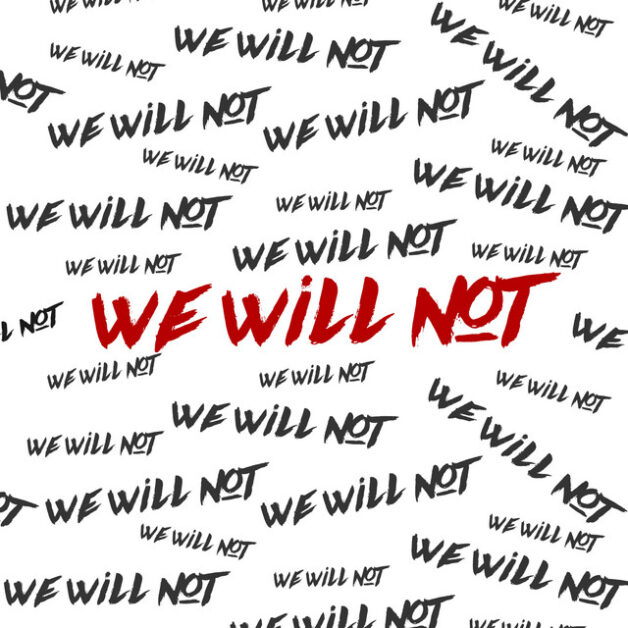
T.I. might be one of the forefathers of Trap music, but there is a socially conscious side to his life’s grand hustle that distinguishes him from the lot. Push aside some of the chauvinistic rhetoric he has espoused or the cloud of controversy that seems to follow him where ever he goes, the Atlanta native wants his people to win.
“We Will Not” tells us also that he wants those who have oppressed us to know that with our winning, there are things that won’t be tolerated.
Unlike other trap anthems that we’ve grown accustomed to hearing from Tip, in this song we get to experience the man he is growing into. As a father and husband, we see him take a no nonsense approach to addressing the mood of the times. Rather than call out the police or the government, he elects to address the people.
Withing the song, he also provides some simple instructions on what we must do to bring about substantial change to out community and what things will not be tolerated.
“All you youngin’s out here in the streets only want to shoot people who look like you … You can stay home, you weak too … Oh no, we will not go and repeat the mistakes of the past … Ignorin’ the snakes in the grass … Payin’ you cash … Still we pray and we fast … Till one day that’s your @ss … We will not ask for no war … No-no-no, but we will be prepared for one … Hoppin’ out with a gun … With the unity, using the same shit you did to destroy me … We sick of the garbage you kickin’ and teachin’, and lynchin’ us … Lockin’ us up for no reason, they killin’ us.”
The song addresses the taking out of Black and Brown leaders by racialized systems who want our voices silenced and the value of Black bodies in America. His frustrations burst at points in the song, but is thinly veiled by that collected cool that is expected from the “King of the South.”
Assassinate all the leaders who leadin’ us … Leave us with ones who misleadin’ us … Then go and reward all the ones who mistreat us … And leave us in projects and give us these poisonous products … On top of narcotics to push to our sisters and brothers … Like them ain’t our sisters and brothers … No we will not be run amuck, led astray … Or bamboozled, the buck’ll be stoppin’ today … See what happen when athletes’ll no longer play for you … Tell them accountants to pray for you … On respect or just respect what that paper’ll do … Look up, it too late for you … Droppin’ you off … Turnin’ them profit to loss.
The commodification of Black bodies is probably the most important “ah ha” moment in the song. T.I., ironically, sees this is his personal life now. When the monkey suit doesn’t fit anymore, you know longer will be their Curious George but will appear to be their King Kong. The rapper reminds us that King Kong has nothing on him!
“Sound of da Police,” KRS-One
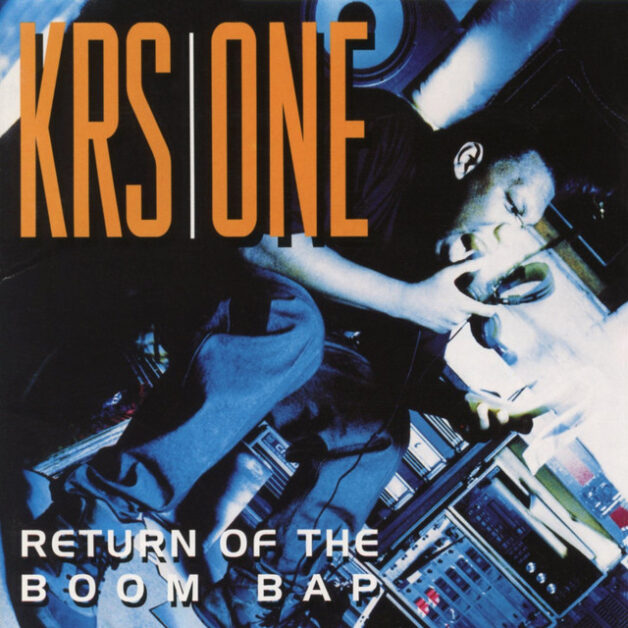
Five years after N.W.A. released “F*ck the Police,” the Blastmaster KRS-One dropped another anti-crooked cop song that not only ignited social awareness, but also was a club banger. “Sound of da Police” became an anthem because its raw lyrics painted a reality that far too many people of color, regardless of region, could relate to.
One notices the true brashness of the Billboard charting song from the vocalized siren “woop woop” in the beginning. KRS-One’s voice blends with the Grand Funk Railroad’s “Inside-Looking Out” and Sly & The Family Stone’s “Sing a Simple Song” samples, and prominently stands out. It conjures the urgent groove of 90s dancehall, while maintaining his own classic boombap style.
“Watch out! We run New York … Police man come, we bust him out the park … I know this for a fact, you don’t like how I act … You claim I’m sellin’ crack … But you be doin’ that … I’d rather say “see ya” … Cause I would never be ya … Be a officer? You wicked overseer! Ya hotshot, want to get props and be a savior … First show a little respect, change your behavior
Change your attitude, change your plan … There could never really be justice on stolen land … Are you really for peace and equality?”
In 2020, Kris Parker still has the same energy that he had back in 1993. He sais, “It’s just every day, f**k the police, straight up. It’s still like that to this very day. July 2020: F*ck the police. When you’re from my hood, from the Bronx, it’s like every day we go get milk, eggs, and fuck the police. We have no respect for that institution at all.”
The Bronx and many other boroughs of New York City have been plagued with crooked cops that either delight in racial profiling or have it so embedded in this psyche that they have no clue that they are doing it. When James Fyfe from John Jay College School of Criminal Justice put out his report Bad Cops: A Study of Career-Ending Misconduct Among New York City Police Officers, he gave a glimpse of the kind of b*lls*t some members of the NYPD be on, giving context to KRS-One’s song.
“Check out the message in a rough style … The real criminals are the C-O-P … You check for undercover and the one PD … But just a mere Black man, them want check me … Them check out me car for it shine like the sun … But them jealous or them vexed cause them can’t afford one … Black people still slaves up til today … But the Black police officer nah see it that way … Him want a salary … Him want it … So he put on a badge and kill people for it … My grandfather had to deal with the cops … My great-grandfather dealt with the cops … My great grandfather had to deal with the cops …
And then my great, great, great, great, when it’s gonna stop?! … Woop-woop! That’s the sound of da police! That’s the sound of the beast!”
“Once Upon A Time In America,” DNA
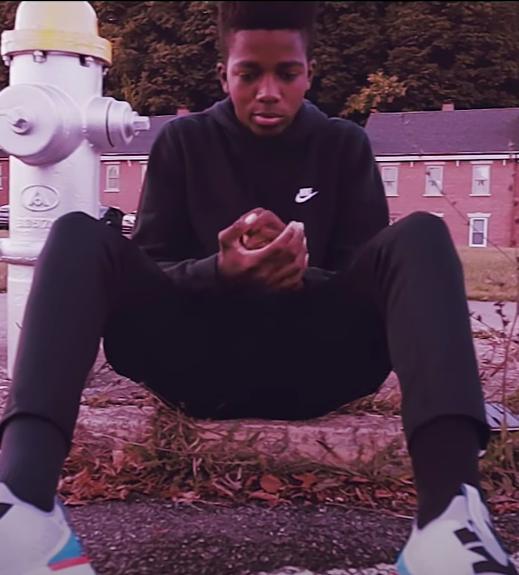
“Once Upon A Time In America” is a song that actualizes Black pain, Black fear and the helplessness of oppressed people. Every day, a Black mother wonders if her child will return — not only because of the dangers of the streets but because of the present dangers of deathly race-based police-violence.
Tired of watching innocent Black people be shot and kid, battle rap champion puts pen to pad to reimagine what it would be like if Eric Garner, George Floyd, but Sandra Bland, Ahmaud Arbery, Trayvon Martin, and Breonna Taylor.
Within this song, he dramatized each tragic scenario of police-involved killing with an ironic twist in the end. Instead of these individuals — all who have played unwilling roles in the Black Lives Matter movement — make it out alive.
With one gun, passed on to another, each victim finds justice. The first verse connects Sandra Bland to Eric Garner with scenarios where they successfully fought for their lives.
“A woman pulls over in a ride … accused of doing 55 … state trooper waves his flashlight but it ain’t sh*t inside … She starts to get this vibe … its sad to watch … he grabs her locks … then beats her with a gun just for a traffic stop … said she assaulted him … knowing she don’t stand a chance … she takes her cell phone and becomes her own cameraman. She’s recording as his stance changes … his hands shaking … no more motion she makes Bland statement … This is an act of justice, not an act of violence … she gives her gun to her boy up in Staten Island … He sells cigarettes … got cartons and cases … the cops got an issue trying to garner his wages … they start swinging throwing low blows … bruise ribs … a broke nose … got him pinned down he can’t breathe in a choke hold … lifts his head up … pushes him off and says ‘f**ck the cops’ … reaches for the gun and hits both of them with a stomach shot … the impact is like the COVID virus times two … try who? You should have saw the way that swine flew (flu) …”
Many criticized this song, believing it advocated the murder of police. However, the song was a simple “what if” the power to defend one’s self (as guaranteed in the 2nd Amendment) really could be applied to Black people profiled by itchy fingered and bigoted police. It is a “wish,” it is a re-imagined reality where these Black people would have come home.
“Words I Never Said,” Lupe Fiasco
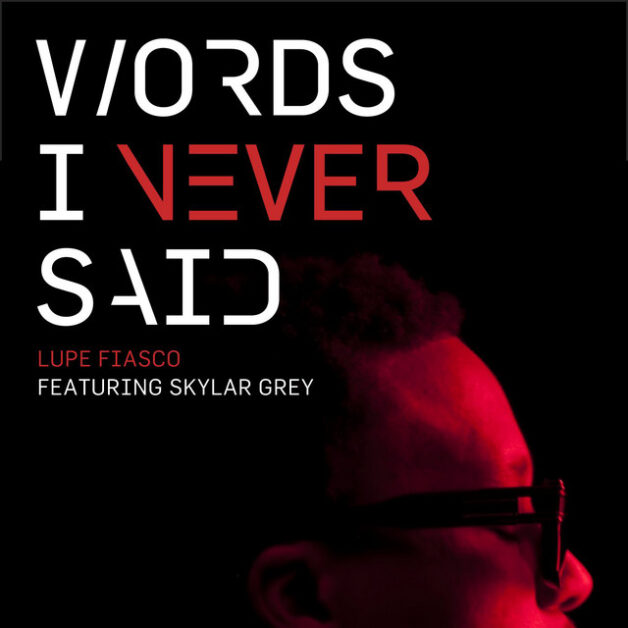
On “Words I Never Said,” Lupe Fiasco used his gift of lyricism to speak about his feelings regarding “the system.”
The evils of the system, a complicated web that includes everything from public education, mass incarceration and government foreign policy, have proved to be justification for his not voting – at least in general elections.
“I really think the War on Terror is a bunch of bullshit … Just a poor excuse for you to use up all your bullets … How much money does it take to really make a full clip? 9/11, building 7, did they really pull it? Uh, And a bunch of other coverups … Your child’s future was the first to go with budget cuts … If you think that hurts, then wait, here comes the uppercut … The school was garbage in the first place, that’s on the up and up … Keep you at the bottom but tease you with the upper crust … You get it, then they move it, so you never keeping up enough … If you turn on TV, all you see’s a bunch of “what the fucks … Dude is dating so and so, blabbering ’bout such and such … And that ain’t Jersey Shore, homey, that’s the news … And these the same people supposedly telling us the truth.”
In “Words …,” the Chicago born rapper also calls for people of color to look to ourselves for solution, asserting to depend on outside-help is meaningless, since it is the outside-help that is doing everything to maintain systemic oppression.
“New National Anthem,” T.I. Harris featuring Skylar Grey
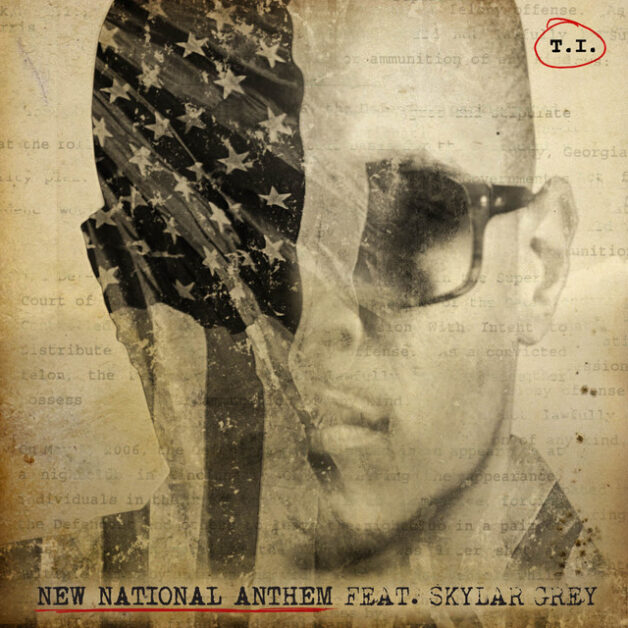
The “New National Anthem” is Atlanta rapper’s T.I.’s ode to America’s culture of violence. A nation that allows an egomaniacal Trump to incite a race-fueled insurrection under the guise of patriotism. In this battle hymn (because isn’t that what anthems are), Tip walks us through the notion that we are products of the hate that begats hate as a nation, whether we want to admit it or not.
He raps, “You say this the home of the brave I guess … I say this the home of the K’s and the vets … All alone with the J’s smoking yay cause he stressed … On chrome with a Tek taught to spray for respect … I learned from the best used to stay in the “jects” … Bought work from the vets burning rubber in the vets … This as good as it gets used to play with the rats … Then I got older and learned stay away from the rats … God blessed this n*gga, to hustle up and make eight figures … Turned from a goon to a great young n*gga … No complaining just doing what it take young n*gga … I was raised in a decade of hate young n*gga … Always dodging polices because they hate young n*ggas”
The often-times-controversial multi-hyphenate also addressed the double standard in law enforcement that affords white people privileges that people of color would never get.
“Let me ask you something … If the kids are the future … Tell me why you can get more for being C.O. … Than you can for being a teacher … Tell me why it means more to the government … To pay the people who got to watch over the prisoners … More than the people who got to keep the children from becoming prisoners … That make sense? Tell me why 9 ounces of crack will get you more time than a rape right now … Tell me why them crazy white boys can tote a gun but I can’t right now …”
“Yea I had felonies, I done did dirt in the streets … But I ain’t ever gave it to anybody that didn’t deserve it, you know what I mean? I ain’t ever ran in no public place with no pistol … Shooting no innocent people. I ain’t never ran in no school killing no kids … Man this is the result of you refusing to deal with the issues at hand … We are a product of the environment you placed us in … We ain’t do it, we just lived through it …”
“Home of the brave and free (message to my people) … Free just to murder me … (Stop waiting on folk to help you, help yourself, it starts with you) … Land of the beautiful (get yourself out, reach back, get somebody else out) … Cursed by the hate we throw … Is this the new national anthem (and that’s the way we’re going to get ahead) … (Sittin’ around waiting on government to do something for us … Ain’t never gonna happen partner they don’t give a f*ck about us) … Is this the new national anthem … (But don’t play into their hand partner, you making it easy for ’em).
For many, the statement within “New National Anthem” may fall on deaf ears, but not the complicated Grand Hustler from the South. This is about revolution, a revolution that is larger than replacing the old anthem. A revolution that is rooted in shifting the mindset of an old America. This is why he has supported Colin Kaepernick in the past. He once said about the athlete in The Undefeated, “The work that he’s been able to do and the awareness he’s been able to bring … is immeasurable. It’s an honor and a pleasure to work alongside him.”
“Otherside of America,” Meek Mill
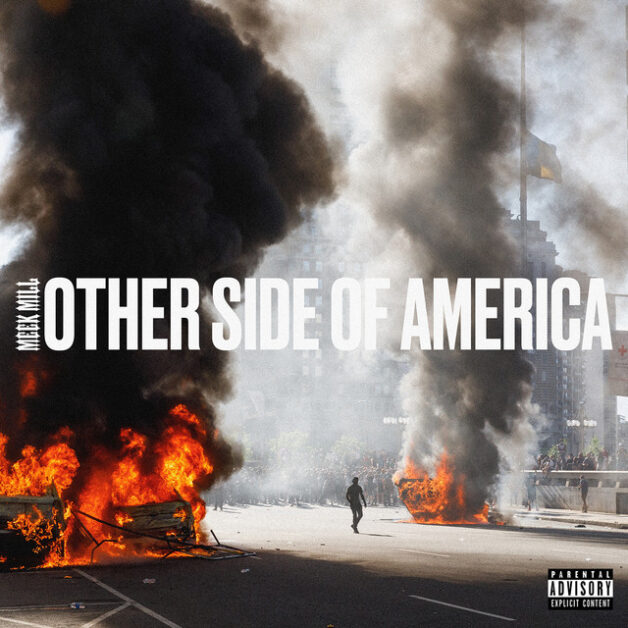
It makes sense that Philadelphia emcee Meek Mill would make a song about the socio-political landscape of America. Afterall, he is a man whose public entanglement with the law has created a movement of reform and help liberate a number of men and women behind bars— fighting for fairer sentences and just treatment. With “Otherside of America,” he paints a story that could very well be his own.
The problem is that it can also be the story of far too many other young Black kids in this country. Simply consider that households are destroyed and unbalanced, older male role models are lost to either jail and the grave, and too many youth are required to figure out adulting through the graphic overtures of the street.
Meek paints this urban reality that presents what happens when money is not pumped into the community.
“I’m where the AKs is, we like the Bébé’s Kids … Ain’t have a daddy, I listened to suckers the same way that Ray Ray did … I’m totin’ Smith &’s and HKs and I just was a grade A kid … Ain’t have no guidance, we grew up with hitters and did everything they said … Point out the block, we spinnin’ that (spinnin’) … Run in the spot, we gettin’ that (get it) … Give us some work, we flippin’ that (flippin’) … I’m hittin’ from jail, they ain’t hittin’ back … I need a lawyer, money for commissary, and nobody ain’t sendin’ that … I’m in my cell like, “When I get out, I’m makin’ a movie, no Cinemax” (woo) … Yeah, back home and I’m fresh on bail … Phone chirpin’, it was next to tell … Block popppin’, it was extra sales … Big dogs, they ain’t showin’ remorse … I was beggin’ just to catch a sale … Same block, we was goin’ to war … I was prayin’ I ain’t catch a shell (check).”
For Meek, the other side of America is at war with the very idea of liberty and justice: a battle won by radical reconstruction or systemic reimagining. The tools of combat is stepping up and showing people that that Black and brown people are not animals, despite being locked up and locked down forever. Seeing why choices are made, should invokes compassion and empathy. And that is what “Otherside of America” does … it is one hell of a movie that should be watched by all.
“Police State,” Dead Prez
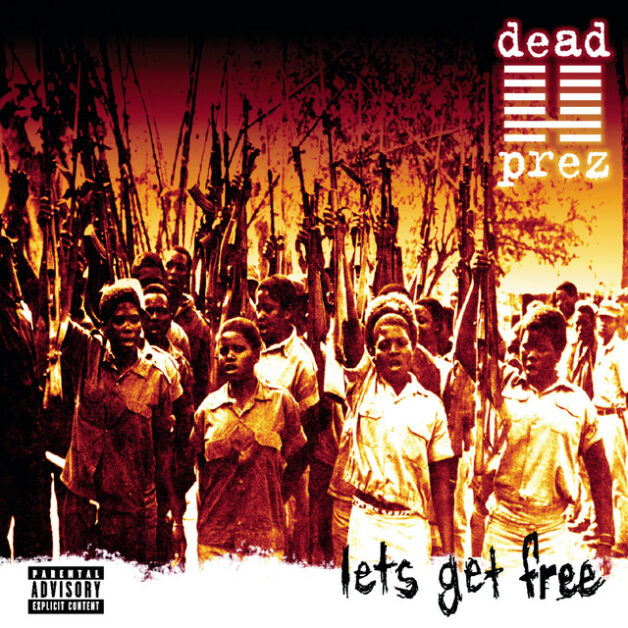
Released in the year 2000, one might think that on their single, “Police State” M1 and Stic were channeling their inner lyrical prophets considering the ways things have manifested over 21 years later in this country. But these two southern emcees were not reading into a crystal ball, but analyzing through history the patterns of oppression and fascism that seems to always unfold with white supremacy. They called it like it was and added a true revolutionary edge to Loud Records on their classic debut album, Let’s Get Free.
Jumping off the song with the powerful voice of Chairman Omali Yeshitela, the founder of the Uhuru Movement, a left wing, African Internationalist organization based in St. Petersburg, Florida. Then the duo pulled back the veil of organized oppression clothed in the disarming disguise of law enforcement. They aren’t protecting nobody, but persuading the masses to walk into a Orwellian trap that lulls the masses to sleep.
“The average Black male … Live a third of his life in a jail cell … ‘Cause the world is controlled by the white male … And the people don’t never get justice … And the women don’t never get respected … And the problems don’t never get solved … And the jobs don’t never pay enough … So the rent always be late, can you relate? We livin’ in a police state”
“Police State” definitely could have been an anthem for the participants in the BLM protests over the summer … and it is no surprise that the Dead Prez was right there with the people.
“How Much A Dollar Cost,” Kendrick Lamar
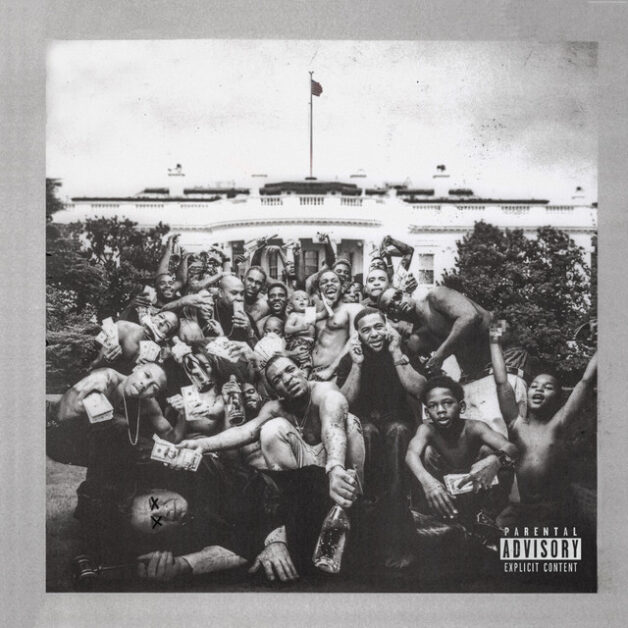
Ask you average first grader and they might answer what they think the question is with 100 pennies … or four quarters. Not listening to the question, they’d furnish a reply based on what they thought you meant … “What makes up a dollar or how much to make a dollar?” A more advance mathematician might surmise that Kendrick was asking, “How many things can you get for the cost of a dollar?” He would be wrong also. With his song, “How Much A Dollar Cost?” K Dot is pushing you to abandon elementary notions of problem-solving to solve the greatest socio-political problem facing America — Apathy.
In the song, Kendrick tells the story of an encounter with a homeless man in South Africa that (in his view) is begging for money to feed his vices. The meeting instead turns into an interrogation of sorts into his soul. Various questions are asked throughout the song that easily invites the listening into this transformative exchange: At cost, is financial success important to you? What is (or is there) currency of payment for the sale of one’s soul/heart/integrity etc. What is the true worth of money? Is it to park up the luxury vehicles, or to pay forward to help one another better our situations?
At the end of the song, the homeless man reveals himself to be God, aka “the Nerve of Nazareth,” a prolific title to the Christian savior given by Kendrick in that last verse.
“I’m insensitive, and I lack empathy … He looked at me and said, ‘Your potential is bittersweet’ … I looked at him and said, ‘Every nickel is mines to keep’ … He looked at me and said, ‘Know the truth, it’ll set you free’ … You’re lookin’ at the Messiah, the son of Jehovah, the higher power … The choir that spoke the word, the Holy Spirit, the nerve … Of Nazareth, and I’ll tell you just how much a dollar cost … The price of having a spot in Heaven, embrace your loss, I am God … I wash my hands, I said my grace, what more do you want from me? Tears of a clown, guess I’m not all what is meant to be.”
And this manifestation of the Imago Dei asking for one dollar bill – “nothing less, nothing more” – forced a man of material riches to confront the selfishness inside of him.
“Impeach the President,” Immortal Technique featuring Saigon, Just Blaze and Dead Prez
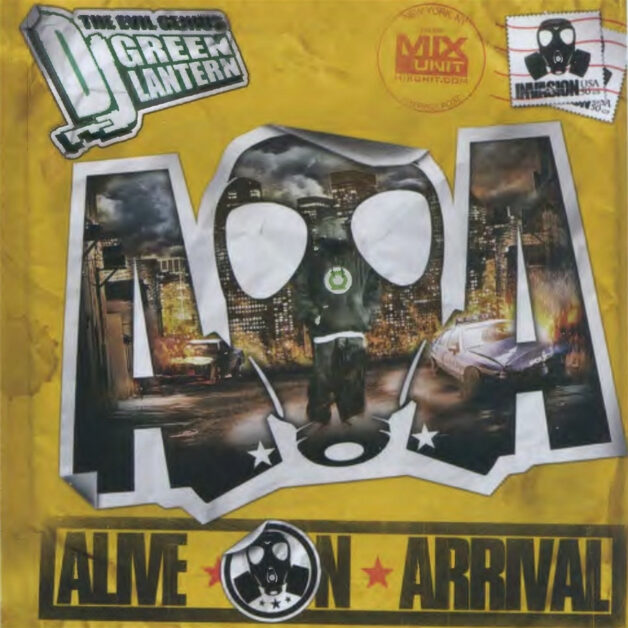
Immortal Technique, Saigon, Just Blaze and Dead Prez took dead aim at George W. Bush, the 43rd president of the United States of America in the song, “Impeach the President.”
The conscious community within rap music stood up on this one, unloading their lyrical ammunition to a familiar Hip-Hop track. While the listener understood the old school flow in their rhyme pattern and felt relationship with the message, this hodge podge of artistry joined forces with a brand new message.
Saigon breaks down the cyclic way that systemic racism in manifested in Black people’s everyday life, while addressing events like 9/11 and its (possible) causes, the hunt for both Osama bin Laden and Saddam Hussein, and the callousness with which that administration sent men and women to fight a battle. He rapped:
“… We can start with the church … You’re politicizing religion, you and your father’s the worst … And um, next: Ya’ll took welfare cheques … Give us diseases and then collect health care debts? (Whatever, what else?) … You only think about yourself … You sendin’ niggas to war while your rifle is on the shelf … George, you’re something else … Osama, could be 10,000 times worser than you … Find him your fucking self … And why act like you care about the troops in Iraq? Cause if you did, you would let them fly back … It’s because of you that those planes got hijacked … You’re also the reason Katrina victims had to die like that.”
M1 takes a different approach. He actually envisioned a new White House, before the Obama administration, where he and his partner Stic-man lead the country.
“How many times do I gotta state my position … Before ya’ll say ‘This lip service, he’s wishin’.’ I been organizing, I’ve got a thousand petitions … Been up before sunrise, writing. I’m on a mission … If I could be president, I would lower the rent … And make stic.man my secretary of defense … My whole cabinet would be niggas who ain’t havin’ it … You think it’s fucked up now? Just watch how bad it gets.”
Just Blaze, usually the beatmaker, notes that George Bush is only a figure head.
“I’ll push Bush off the White House roof … Calling chickens coming home to roost, it’s overdue … N*ggas taken advantage of, taken for granted … For the hungry, for the ‘hood, for the good of the planet … But not to get it twisted, Bush is only a figurehead … It’s bigger yet. The whole system needs to be put to death … If I was president, then I’d get rid of the whole office … Pimp the system out and make the people the bosses.”
IT anchors the song with an extraordinary level of raw disgust.
“Either stand him, wear the rifle or reach him … Or some bitch give him a blow job so we can impeach him … Teach the motherfucker about the drama I bring … And cut Dick Cheney’s hands off for pulling the strings … This is for all my niggas locked in the P … That’ll never see the sun until the revolution is bring …”
“Al-Qaeda and America been doin’ business well … They’re tighter than Interscope and XXL … From the patriot act to rape in Iraq to … Russia’s war with Afghanistan taking it back to Texas … Governor, your state is the most polluted … And you had the most niggas executed.”
“Man Plans God Laughs,” Public Enemy
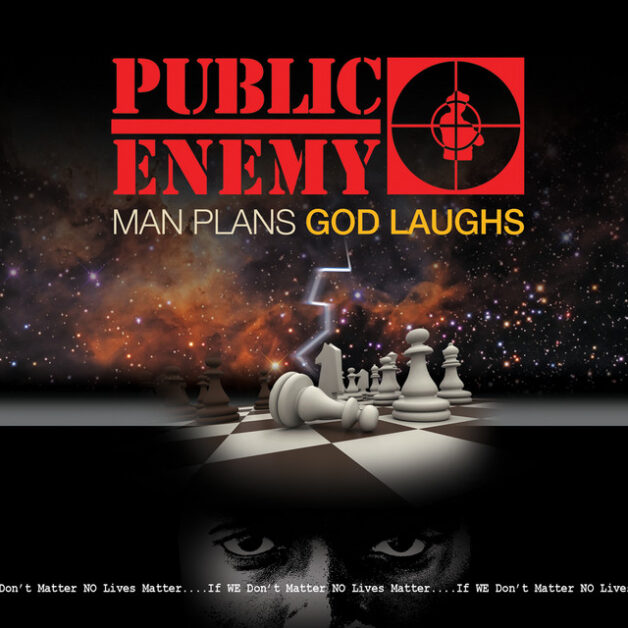
It is no surprise that Public Enemy appears on this list several times. The group at its core is the personification of 400 years of race-based oppression translated through the gifted genius of rap music. In another epic example of how Chuck D, Flavor Flav and the other members of the revolutionary quad reinvents themselves, they put out the 2015 song, “Man Plans God Laughs.”
The phrase “Man Plans, God Laughs” comes from an ancient Yiddish proverb – that also translates as “Man proposes, God disposes.” The meaning of the saying is that no matter how thorough or thought out one’s plans might be, there are forces greater that can render the most well-thought out plans inapplicable.
This was best articulated, “Let it be … Speaking words … But no wisdom … Make em dumb … Damn the plan … That man made … Threw the monkey wrench.”
Chuck also speaks on the “plan” to set narratives of despair and hopelessness around the AA community. We can be the folly of those plans by becoming the change within ourselves. He also notes that there is a reason why we should do it: “do it for the culture, do it for the youth.”
“Bagbak,” Vince Staples
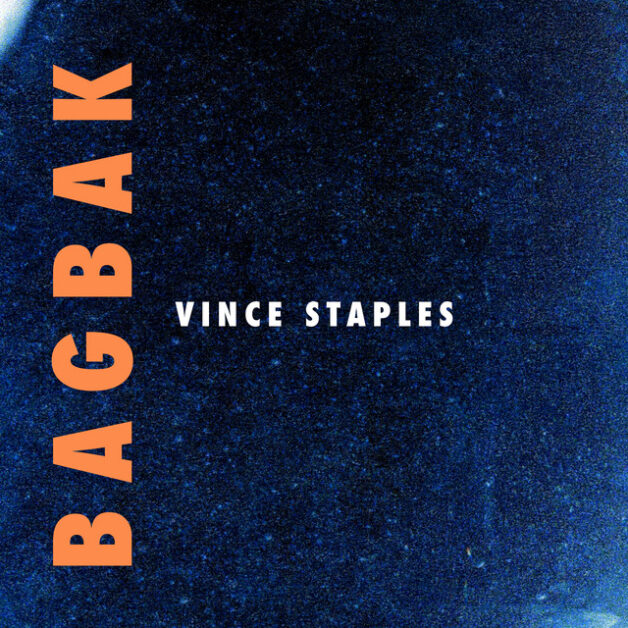
People talk about the younger generation like they have no clue what is going on. With generational mascots like Tekashi 69, it is hard to discern anything from the popular Hip-Hop but party and gangsta music. However, there are some artists (from the West Coast) who have position themselves in the tradition of Ice Cube and Ice T, Chuck D and KRS One, Scarface and Andre Benjamin, where they you hard-hitting hood influence lyrics to craft musical masterpieces that challenge the government and status quo.
Vince Staples is such an artist and his single “Bagbak,” so bop ready, is an exquisite example of that.
The song’s title is slang for “back up” or “back off.” There in its 2 minutes and 41 seconds, Vince is unapologetically calling out for not just representation, but representation for darker melanated people. Color identity and issues surrounding complexion have affected Black people since the days of enslavement. And with this song he brings it to the forefront with lines like, “This is for my future baby mama … Hope your skin is black as midnight” or “Pray the police don’t come blow me down ’cause of my complexion.”
His words are far from some ignorant hood dude, asking for you to see his Black skin. He is setting up his own model of protest that intentionally interjects his race into his complicated understanding of politics and power.
“Prison system broken, racial war commotion … Until the president get ashy, Vincent won’t be votin’ … We need Tamikas and Shaniquas in that Oval Office … Obama ain’t enough for me, we only getting started … The next Bill Gates can be on Section 8 up in the projects … So ’til they love my dark skin … B*tch I’m goin’ all in.”
The future is not lost on Vince Staples at all.
“Somethin’ Ain’t Right,” Masego, JID and Rapsody
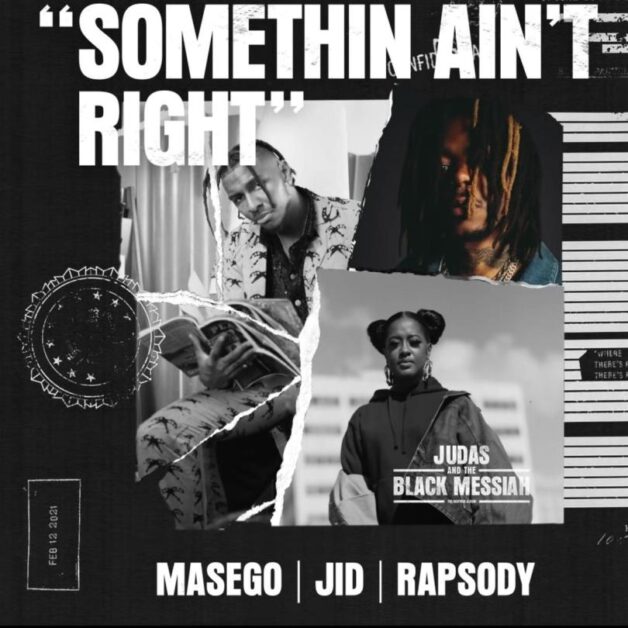
Singer Masego appears on this Hip-Hop list with a beautiful tribute to Fred Hampton with “Somethin’ Ain’t Right.” He partnered with rappers Rapsody and JID to signal to the Baby Boomers and Gen Xers that they (this generation) have not forgotten the elders’ contribution to Black American liberation and the devilism practiced to destroy the movement. At the same time, they weave in the condemnation of police-involved violence perpetrated toward individuals living while Black.
The chorus chants, “Hold up! Wait a minute. Something ain’t right!” It further goes into the truest statement ever, “The corruption has moved in view of my eyesight.” It is refreshing to hear new voices boldly approach the topic of social injustice and the power of “YOU AIN’T SLICK, WE SEE YOU,” during a time when many believe folk under 35 are all blinded by the hustle, money and social media based-realities — which are not realities at all.
JID is first to grab the mic.
“And as I lay me, as I lay me down, me down to rest …I lay my sword, my lady lays upon my chest … It’s been a crazy war, the devil’s bangin’ on my door … My dear, my dear, my dear, I hear the shots ring, lay on the floor … I don’t fear anyone but the maker
‘Cause we can never murder hate but can murder a hater … What’s a more American way to try to give ’em a taste of they own medicine? Prevalent ethnic rebel, the revolution of melanin … Bust a move to the ghetto, we must improve the development … Brought some food for the fellowship, got a noose on my brethren … Call the goons and the government, come correct the corruption … Break the racial construction buildin’ up … In the spirit of liberation, give me life or I’ma take it … That’s my human right, universally, you and I, we could be unified … But when you speakin’ truth beyond your youth, they want you euthanized … Creepin’ through the night, hear something movin’, right? Intruders, intruders.”
His verse creatively juxtaposes the cop killings of Breonna Taylor with that of the Chairman Fred Hampton. Opening it up for Rapsody’s rhyme reflects that how Black people’s fight for freedom is ordained by God.
She starts by speaking to The Most High.
“Hol’ up (Hol’ up), watch over me and my body, man (Come on) … Trouble all around, can’t trust nobody, man (Real) … Devil on my heels and they all wanna cross me (Uh)”
The song follows the tradition of great freedom cries and is evidence that young people are locked into trumpeting for the liberation of African people.
“My Vote Don’t Count,” YelloPains
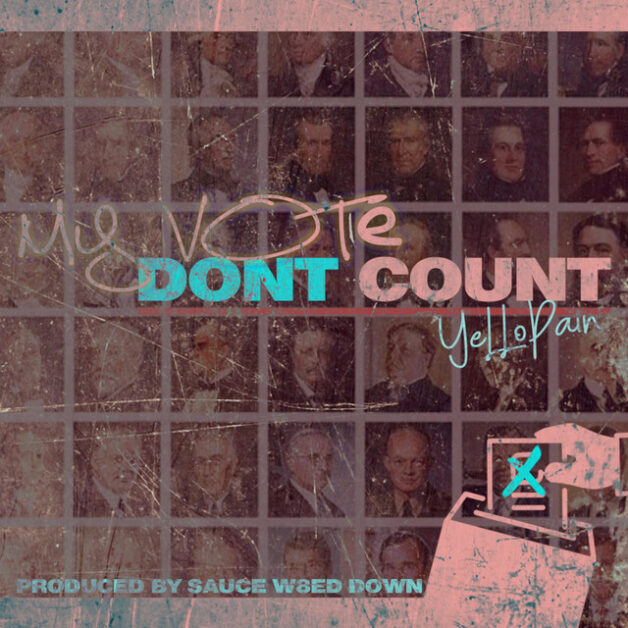
YelloPain did something clever here – spoke on the importance of voting in local and legislative elections. Breaks it down in bars how your vote effects your everyday life, especially at the local and state levels. Also reminds us that we have a say in who gets to bang gavels and set judgements on our freedom.
“Our Babies 2 (Crazy World),” Saigon
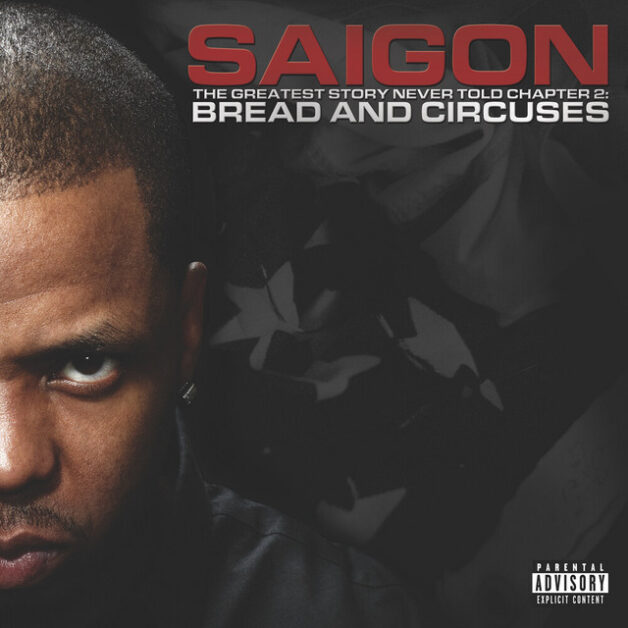
From his The Greatest Story Ever Told 2: Bread and Circuses album, “Our Babies 2 (Crazy World” was a ridiculous platform for Saigon to lay his most political self on the line. Never one to hold his tongue on anything, he reminds aged listeners in of a street version of Chuck D, over slicker style of production.
On the song, he touches on a myriad of topics ranging from racial and school violence – even putting forth the controversial question that quiries whether or not Bin Laden should have been afforded a fair trial.
“It’s something I can’t call … They killed Bin Ladin and everybody just smiled … If he did what’s alleged then yeah that maggot is foul … Question I ask you is what happened to his trial? It’s a crazy world!”
He then continues, “Wow, we represent war, the first thing you hear … It’s in the Star-Spangled Banner the verses is clear … the rocket’s red glare, bombs burst into air … make it harder for peaceful people to persevere.”
“The Product,” Ice Cube
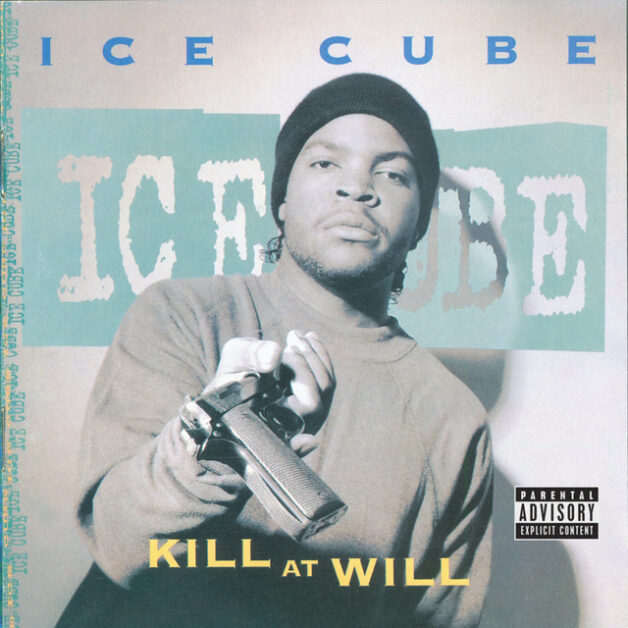
The politics of this song are nuanced and layered. They speak the psycho-social damage that Black men undergo as the world n*ggerizes them from birth.
Off the Kill At Will EP, the only extended play project that the Ice Cube ever made, is this stingingly descriptive biography that takes us from seed to tomb.
“And it was hell tryin to bail to the ovary … With nothin’ but the Lord lookin’ over me … I was white with a tail … But when I reached the finish line young Black male! One cell made two and two cells made fo’ … And so on so now I’m a embryo … Then I got a hunch … That I’ma be on lock down, for nine months … Chillin’, with my mother to guide me … And nothin’ but a stomach to hide me … From all that worry and bullshit … Nine months later, I elbow pull and kick … Cause my time is up and I don’t care … With one big push, I’m outta there … June 15th, it’s just my luck … In 1969, a nigga is the product.”
At 21, Cube was still a relatively new solo artist and was becoming regarded for adding significant substance to the street-influenced lyrics which trademarked his time as a member of NWA. This track captures the idea that some people are born to be disregarded, abused and struggle as it takes a first-person journey of a kid being born, growing up in South Central, and navigating almost every pitfall the hood has to offer a young Black Man. No happy endings here, just dark reality, he graphicly paints the picture of how the educational system did not serve him.
“Cause I’m sittin’ in history … Learnin’ bout a sucker, who didn’t give a f*ck about me … They try to shape us … But I know Uncle Sam is a mother*ckin’ rapist … So I stopped payin’ attention Ice Cube, headed, straight to detention …”
But it is also from this space that he (and so many others) reshape the dreams of their parents and become civic pariahs and the scourge of the community introducing drugs and gangbanging into their narrative.
“A high school dropout … My father had beef so I tried to knock pops out … But I got tossed, he’s the boss … I’m out of there and mad cause I lost … Now bein’ on my own is a factor … So I become, the neighborhood jacker … Gimme your car, run your jewels … Makin’ a livin’ robbin’ fools … And if I let my nine rang out … You know, it’ll make your brains hang out … So what’s your fate? Am I the nigga you love, or the one you love to hate? The wrong answer is said, the nigga fled … I pump lead, now he’s in a puddle of red … And if you got a buck, you’re shit out of luck … Stuck up by the mother*ckin’ product.”
“The Devil Made Me Do It,” Paris
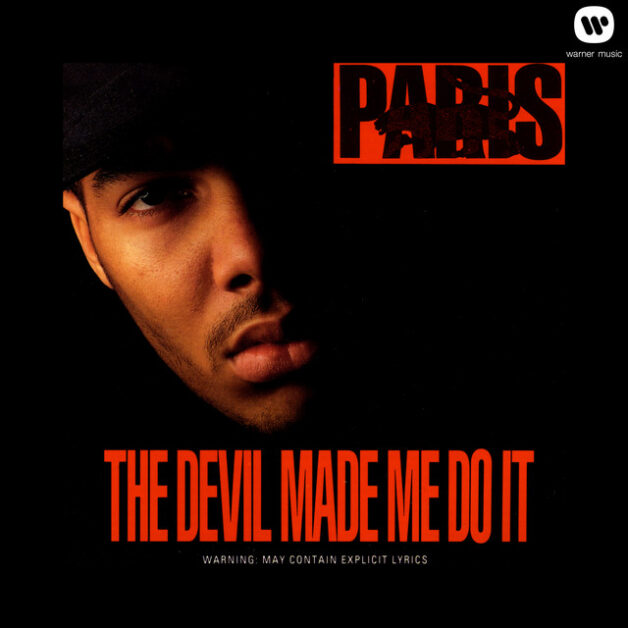
The list has to end with Paris’ “The Devil Made Me Do It.”
The militant nationalist was one of the most controversial figures in Hip-Hop during the late 80s and early 90s. His lyrics had no problem calling out “devils” that pushed Black and brown people into spaces that did not allow them to thrive in their best identities.
Straight out of the Bay-Area, Paris (whose real name is Oscar Jackson Jr.) was literally too hard and too conscious for the music industry. “Devil Made…” was very first single off his favorite single from his debut album of the same name.
“P-Dog comin’ up, I’m straight loc … Pro-black and it ain’t no joke … Comin’ straight from the mob that broke shit last time … Now I’m back with a brand new sick rhyme … So Black check time and tempo … Revolution ain’t never been simple … Followin’ the path of Mao and Fanon just … Build your brain and we’ll soon make progress … Paid your dues, don’t snooze or lose … They came with the masterplan that got you … So know who’s opposed to the dominant dark skin … Food for thought as a law for the brother man.”
Lyrics like these drew the ire of MTV execs and even the FBI, causing it to be banned from airing on the network. If you thought that NWA’s “FTP” and 2 Live Crew’s “Banned in the USA” were agitants to the government, imagine what these did to get under their skin!
His content – which unapologetically did not rule out violence as a way to end oppression – also scared his record label Tommy Boy that eventually dropped him.
“…Then spit on your flag and government … Cause help the Black was a concept never meant … N*gga please, food stamps and free cheese … Can’t be the cure for a sick disease…”
